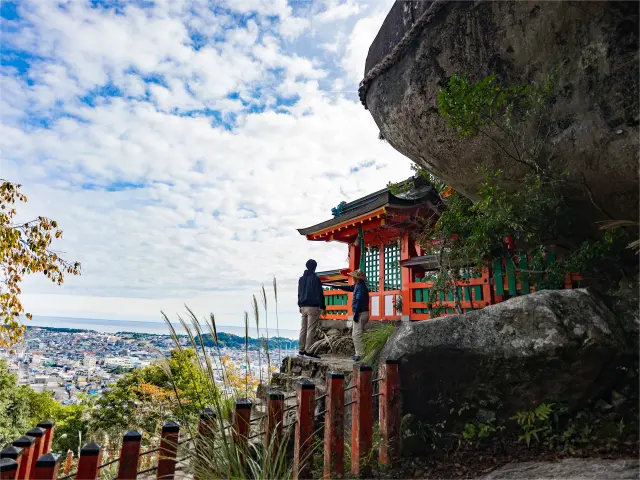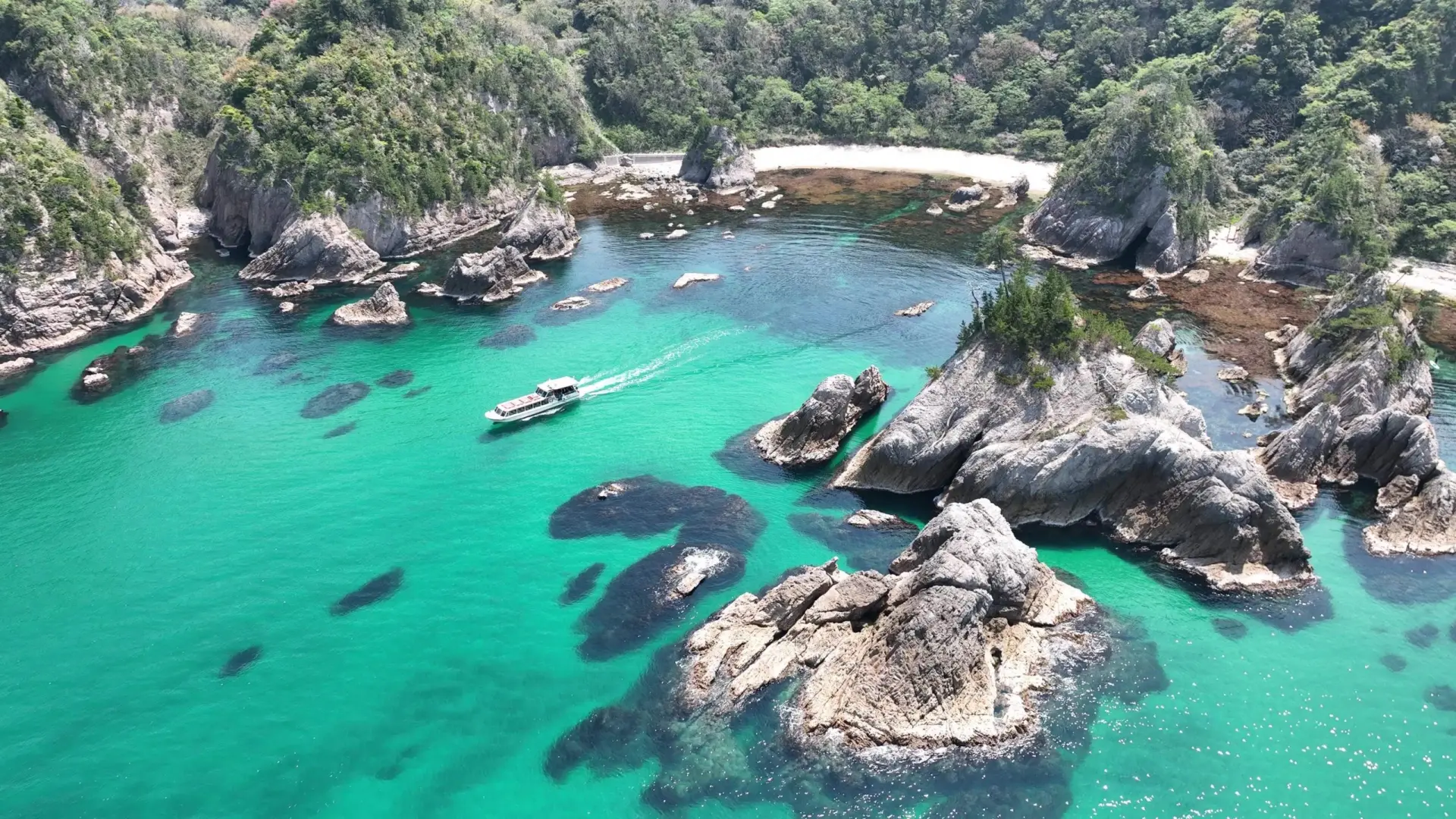
Tottori: A Journey to Unwind in the Majesty of Nature at San’in Kaigan Geopark
Last update
Shaped over tens of thousands of years by wind and sand, the San’in Kaigan Geopark is home to some of Japan’s most breathtaking natural landscapes, including the Tottori Sand Dunes, one of the largest sand dunes in Japan.
Start your journey by exploring the Tottori Sand Dunes, then unwind in a soothing hot spring at night.
On Day 2, venture to Uradome Coast, a designated Natural Monument of Japan located within the San’in Kaigan National Park. Board a sightseeing cruise to admire the rugged rock formations and massive cliffs, sculpted over time by the harsh waves and winter storms of the Sea of Japan. Then, dive deeper into the San’in Kaigan UNESCO Global Geopark at the Sea and Earth Science Museum, where you’ll uncover the geological wonders of this unique coastal region.
Embark on a journey into the raw beauty and dynamic landscapes that make the San’in Coastline truly one of a kind!
Table of Contents
DAY1
8:00am – Depart from Osaka
Begin your journey by renting a car in Osaka and hitting the road.
After an approximately 2-hour and 45-minute drive, arrive at your first stop:
San’in Kaigan National Park – Tottori Sand Dunes Visitor Center.
11:00am – Start Your Sand Dune Adventure at the San’in Kaigan National Park Tottori Sand Dunes Visitor Center
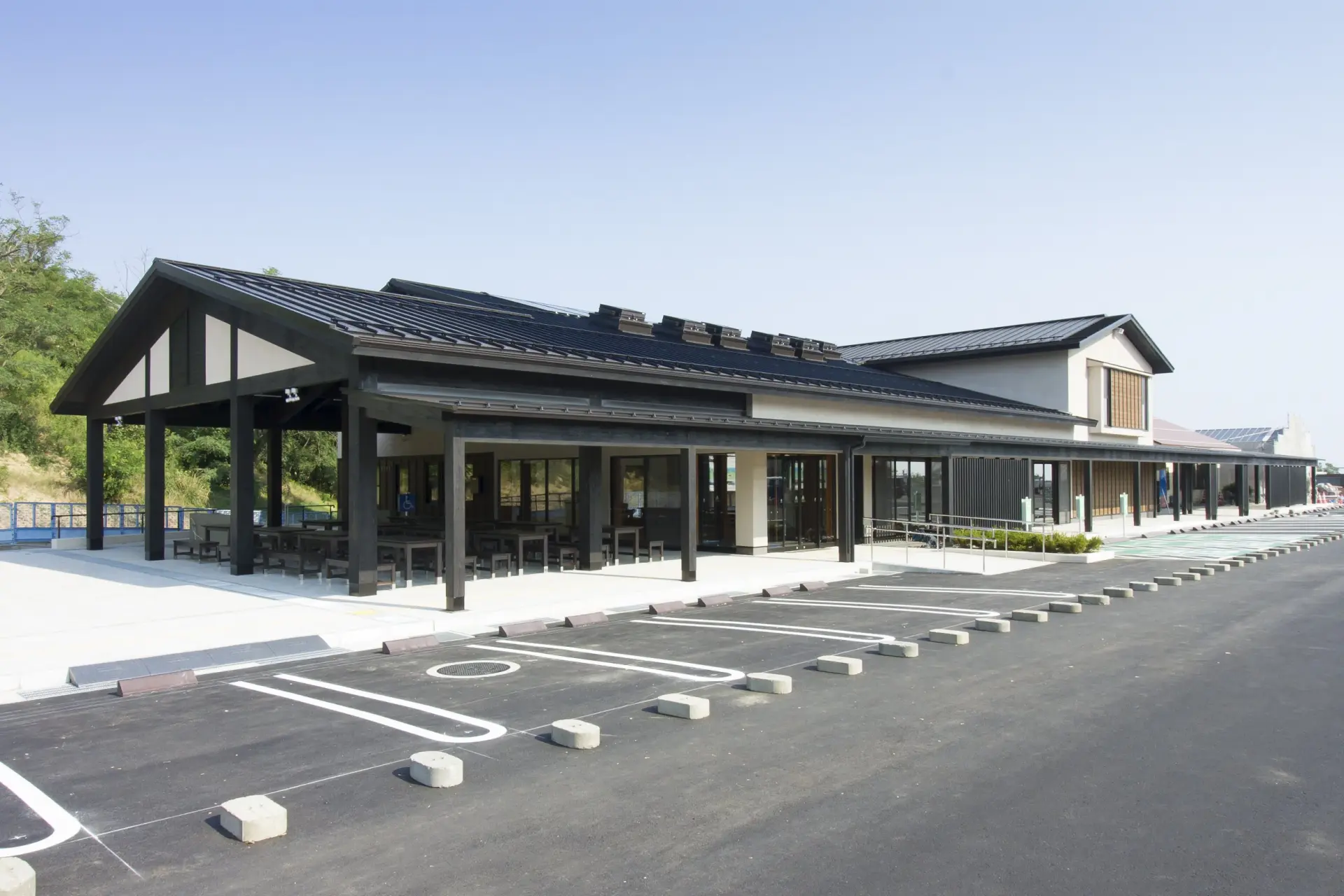
Park your rental car at the Tottori Sand Dunes Parking Lot, located right in front of the San'in Kaigan National Park Tottori Sand Dunes Visitor Center. Parking fee: 500yen per car (valid for 24 hours).
After a long drive, the first stop is the Visitor Center, where knowledgeable guides are always on hand to provide tourist information about the sand dunes.
Stepping out of the car, you can feel the sea breeze in the air—take a deep breath and soak in the atmosphere.
Inside, the center features a variety of exhibits explaining the formation of the Tottori Sand Dunes, the plants and animals that inhabit the area, and the relationship between people and the dunes. The life-size animal models are so realistic that I couldn't help but stop and stare, almost expecting them to move!
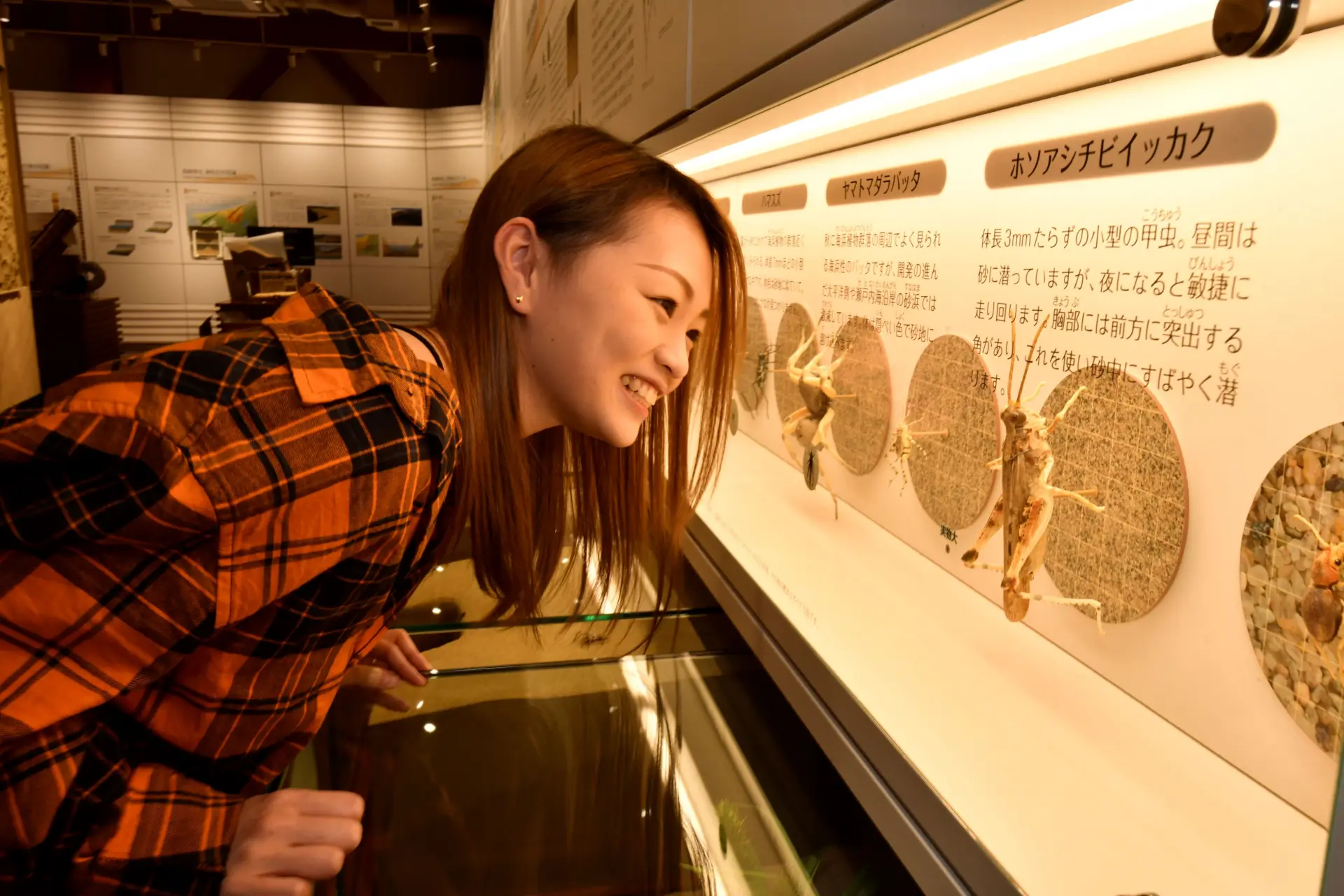
Ikimono Zone, complete with specimens and models of the plants and animals that inhabit the sand dunes.
Next, head to the Sunakura mini-theater to experience the dramatic, ever-changing landscapes of the sand dunes through an immersive video presentation. See the dunes transform over time and across seasons as a perfect warm up for your visit.
There also an indoor rest area with a 4-meter-long exposed volcanic ash layer exhibit, displayed in an open, high-ceiling space—it’s definitely worth a closer look!
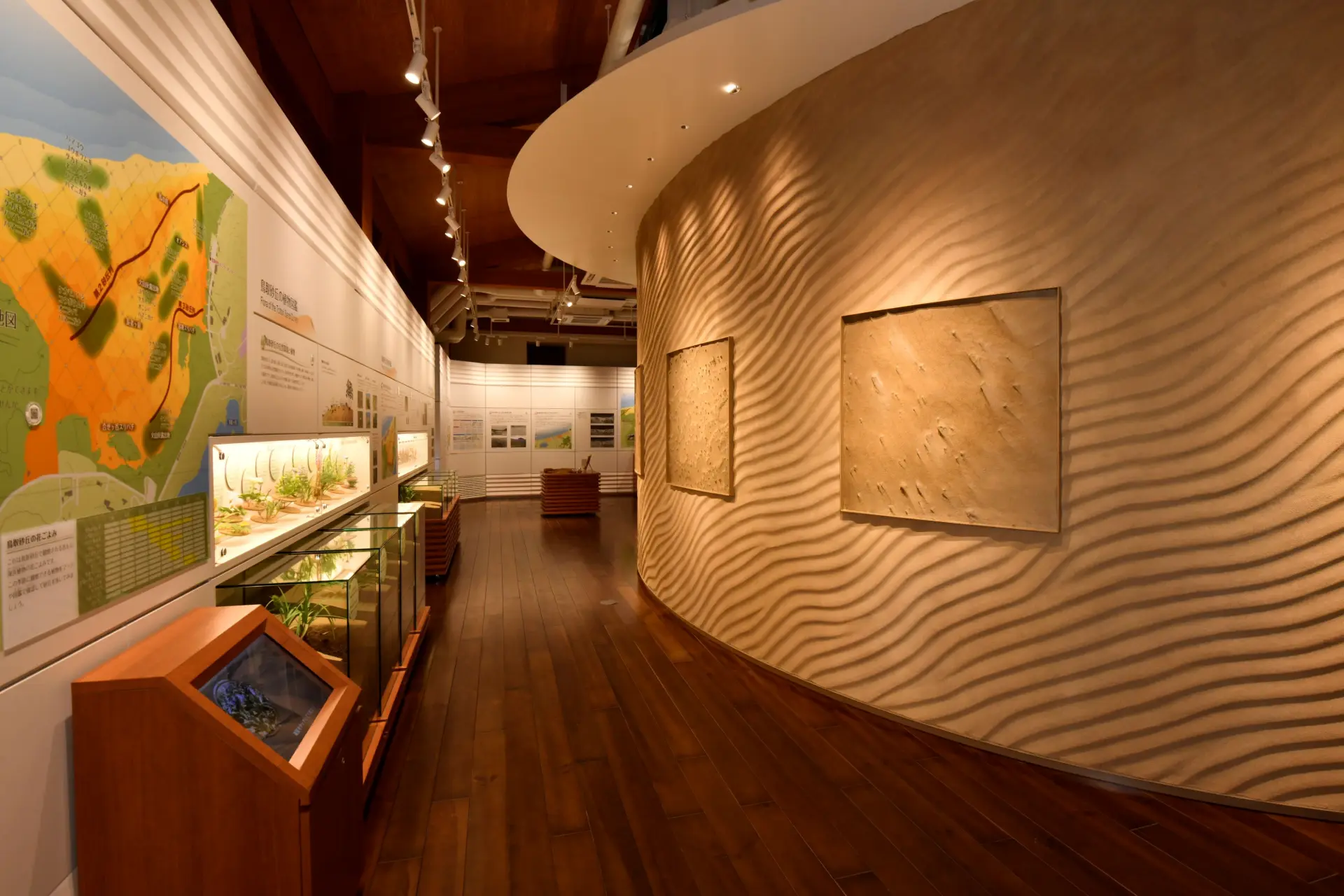
The Sunakura walls were molded using real sand ripples from the actual dunes, available for you to touch and explore with your fingertips.
The facility also has foot-washing stations and towel vending machines, which come in handy after walking through the Tottori Sand Dunes—since sand is bound to get into your shoes! I made a mental note to stop by on my way back.
Basic Information
- Name in Japanese
- 山陰海岸国立公園 鳥取砂丘ビジターセンター
- Postal Code
- 689-0105
- Address
- 2164-971 Fukubecho Yuyama, Tottori City, Tottori
- Telephone
- 0857-22-0021
- Access
-
From JR Tottori Station, take the Sand Dunes Line bus and get off at Sakyu Kaikan (a short walk), or take the Iwami Iwai Line bus and get off at Sakyu Higashiguchi, then walk 10 minutes.
By car, it’s about 20 minutes from the Tottori IC on the Tottori Expressway. - Business Hours
- 9:00am - 5:00pm
- Admission
- Free
- Closed
- Open every day
- URL
- URL
12:40pm – Lunch at Sakyu Center Miharashi-no-Oka via Scenic View Terrace
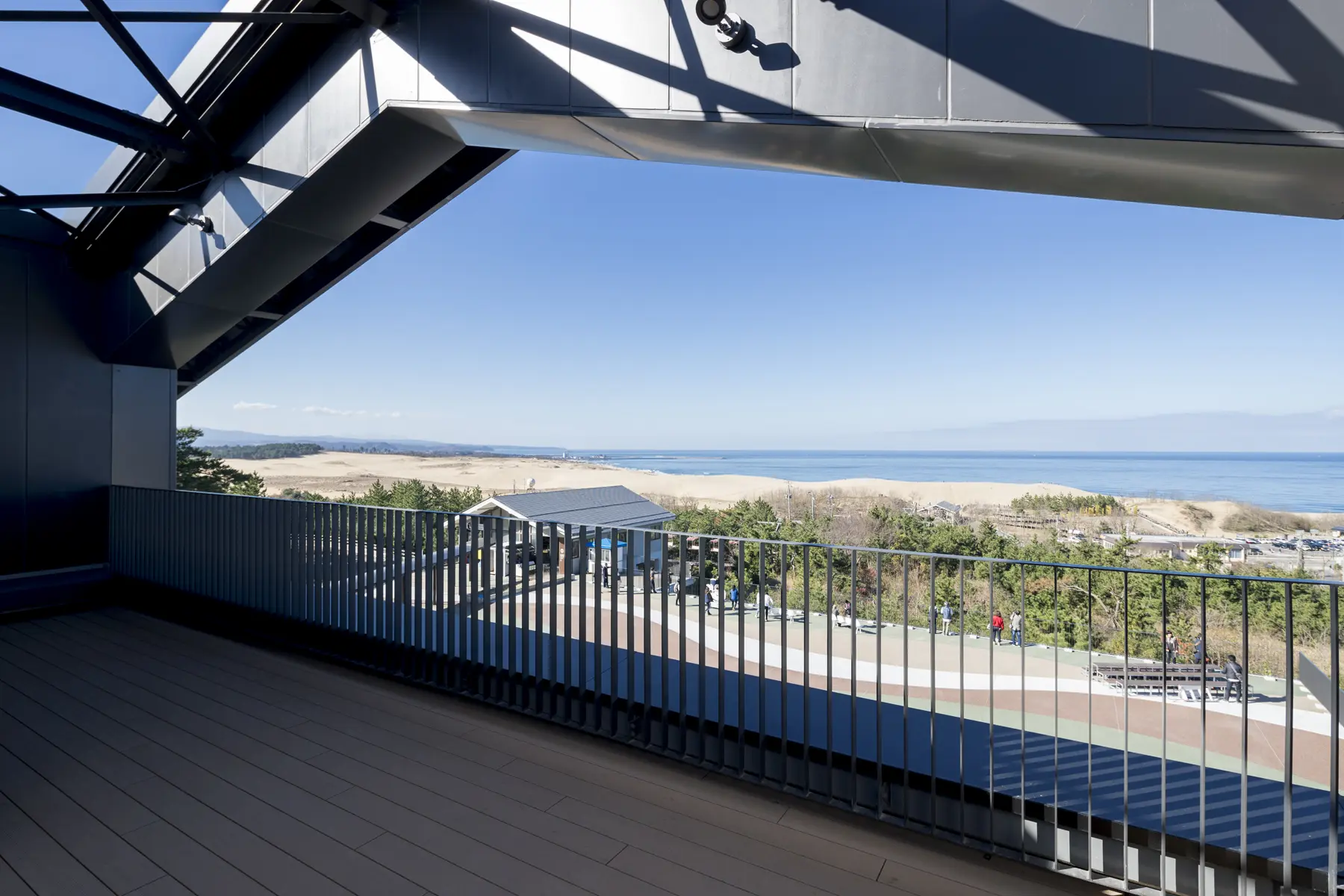
The panoramic viewing terrace offers a sweeping vistas of the Tottori Sand Dunes that are vast enough to knock your socks off!
Next up is a stop at Sakyu Center Miharashi-no-Oka, a multi-purpose facility located on a small hill that keeps a souvenir shop, restaurant, and observation deck on site.
The hands-down highlight here is the famed Sand Dunes Seafood Bowl (served with small side dishes and miso soup), known since making rounds on social media!
Out comes the full pomp and circumstance of tasteful seafood, all in an arrangement to make anyone smile. The fresh bites dance with the flavor of the season, making for a taste of satisfaction for the belly and soul.
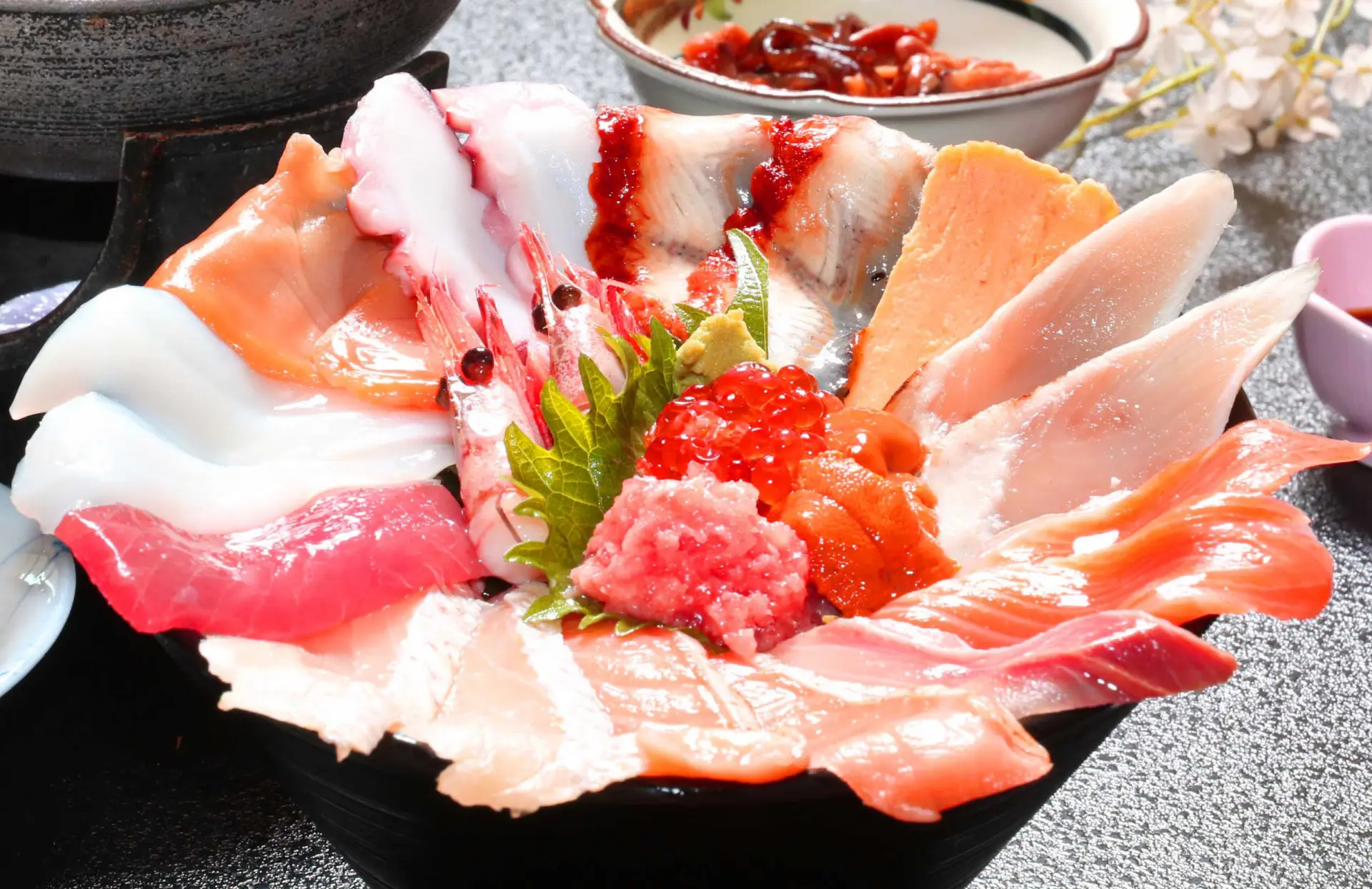
The ever-popular Seafood Merry-Go-Round bowl is the moniker for a lavish dish featuring over 10 types of fresh seafood and the pure taste of seaside indulgence!
After lunch a trip to the observation terrace on the top floor brings you to a full panorama of the Tottori Sand Dunes to check out before heading over. Stretching far and wide with the Sea of Japan at its back, this view is always one for the books!
Basic Information
- Name in Japanese
- 砂丘センター見晴らしの丘
- Postal Code
- 689-0105
- Address
- 2083 Fukubecho Yuyama, Tottori City, Tottori
- Telephone
- 0857-22-2111
- Access
-
From JR Tottori Station, take the Tottori Sand Dunes Line bus or the Loop Kirin Shishi-go bus and get off at Sakyu Center Tenboudai (a short walk).
By car, it’s about 20 minutes from the Tottori IC on the Tottori Expressway. - Business Hours
- 9:00am - 5:00pm (Restaurant: 11:00am - 2:00pm, hours may vary by season).
- Closed
- Open every day
- URL
- URL
2:00pm – Ride the Tottori Sand Dunes Sightseeing Lift for a Stunning Aerial View
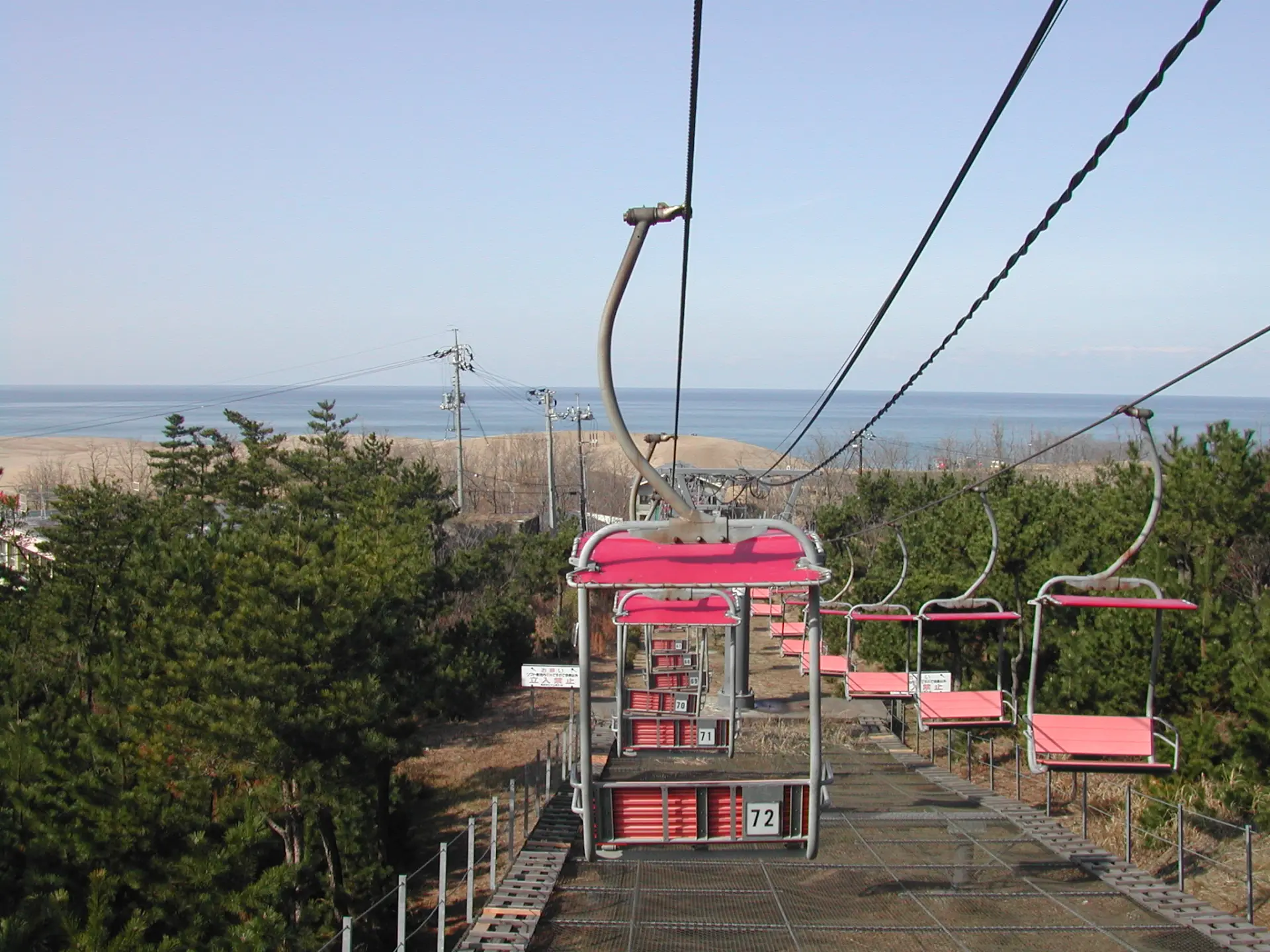
Swaying gently on the lift in a moment of easy bliss.
Take the skies via the sightseeing lift on on your way between Sakyu Center Miharashi-no-Oka and the Tottori Sand Dunes.
Tickets are available to purchase over at the vending machine just outside the Sakyu Center Miharashi-no-Oka building so you can swing by on your way to the boarding area.
From here the lift takes a slow descent passed neighboring trees, almost as if walking the skies of the forest. The ride only takes about five minutes before arriving at the entrance to the Tottori Sand Dunes!
Basic Information
- Name in Japanese
- 鳥取砂丘観光リフト
- Postal Code
- 689-0105
- Address
- 2083 Fukubecho Yuyama, Tottori City, Tottori
- Telephone
- 0857-39-2111 (Sakyu Center Miharashi-no-Oka)
- Access
-
From JR Tottori Station, take the Tottori Sand Dunes Line bus or the Loop Kirin Shishi-go bus and get off at Sakyu Center Tenboudai (a short walk).
By car, it’s about 20 minutes from the Tottori IC on the Tottori Expressway. - Business Hours
- 9:30am - 4:00pm (Hours may vary depending on the season, weather, or maintenance).
- Fares
-
Adults: Round-trip 400yen / One-way 300yen
Children (ages 4 to elementary school students): Round-trip ¥300 / One-way 200yen - Closed
- Open every day
- URL
- URL
2:05pm – Explore the Jaw-dropping Form of the Tottori Sand Dunes
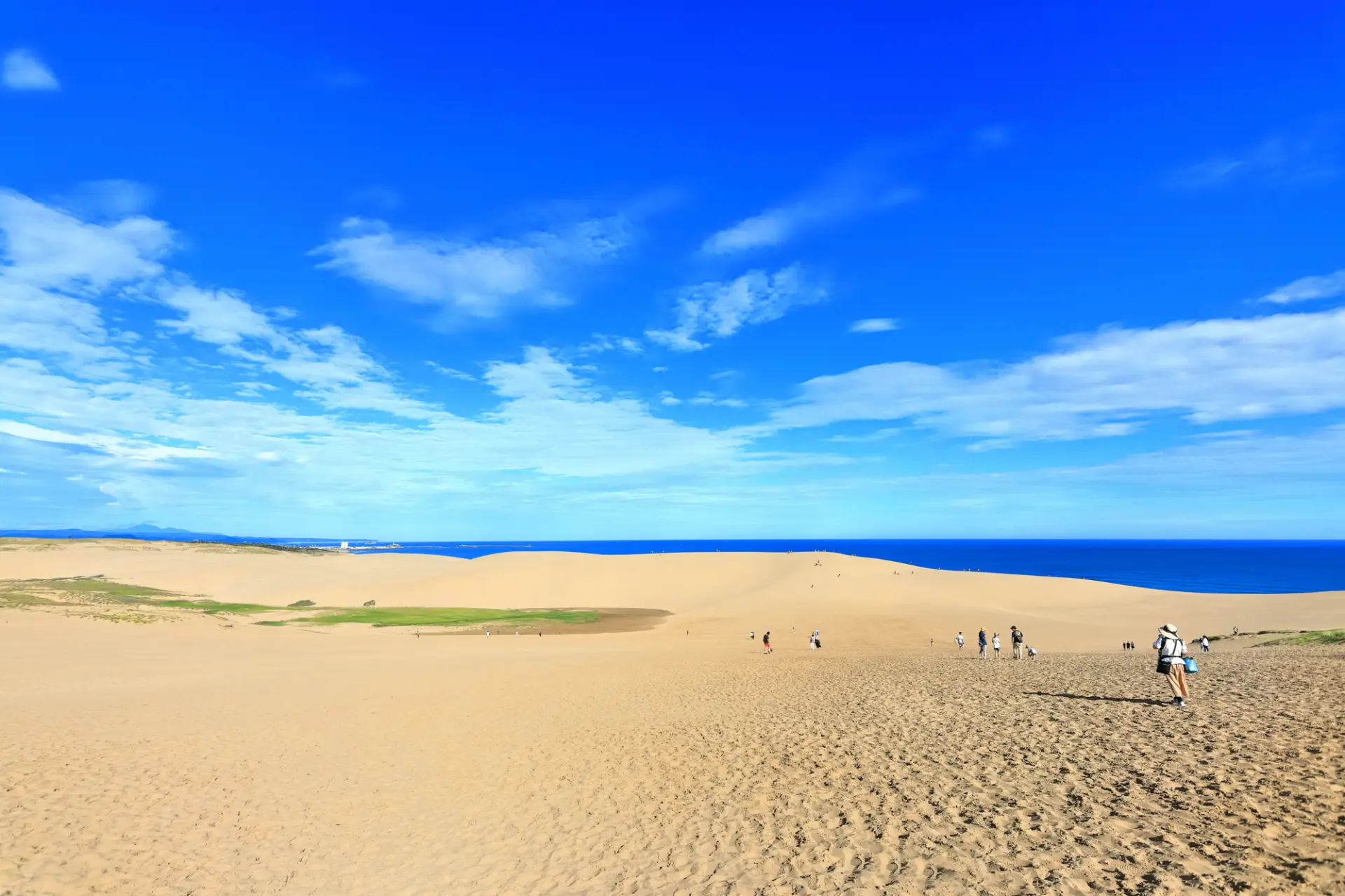
A National Natural Monument and Specially Protected Area, the Tottori Sand Dunes are one of Japan’s largest sand dune formations.
Located within San’in Kaigan National Park, the Tottori Sand Dunes stretch approximately 16 km east to west and 2 km north to south, making them one of Japan’s largest dune formations. The dunes rise and fall against the Sea of Japan, still untouched by coastal development for a glimpse at ancient, awe-inspiring beauty.
One of the first destinations to aim for is Umanose, a towering sand ridge. Walking across the soft, shifting sand can be quite a challenge, and climbing the steep 47-meter-high slope may feel daunting. Be assured the journey up is always worth the trip thanks to the breathtaking panoramic view of the sprawling Sea of Japan on the other side.
The sand dunes also feature unique natural phenomena. In the central area, you can find the Oasis, a spring-fed pond that contrasts beautifully with the surrounding sand. There are also exposed layers of volcanic ash, which have remained visible since a volcanic eruption around 60,000 years ago. Another highlight is Oigo-Suribachi, a bowl-shaped depression approximately 20 meters deep, adding to the dynamic and ever-changing landscape.
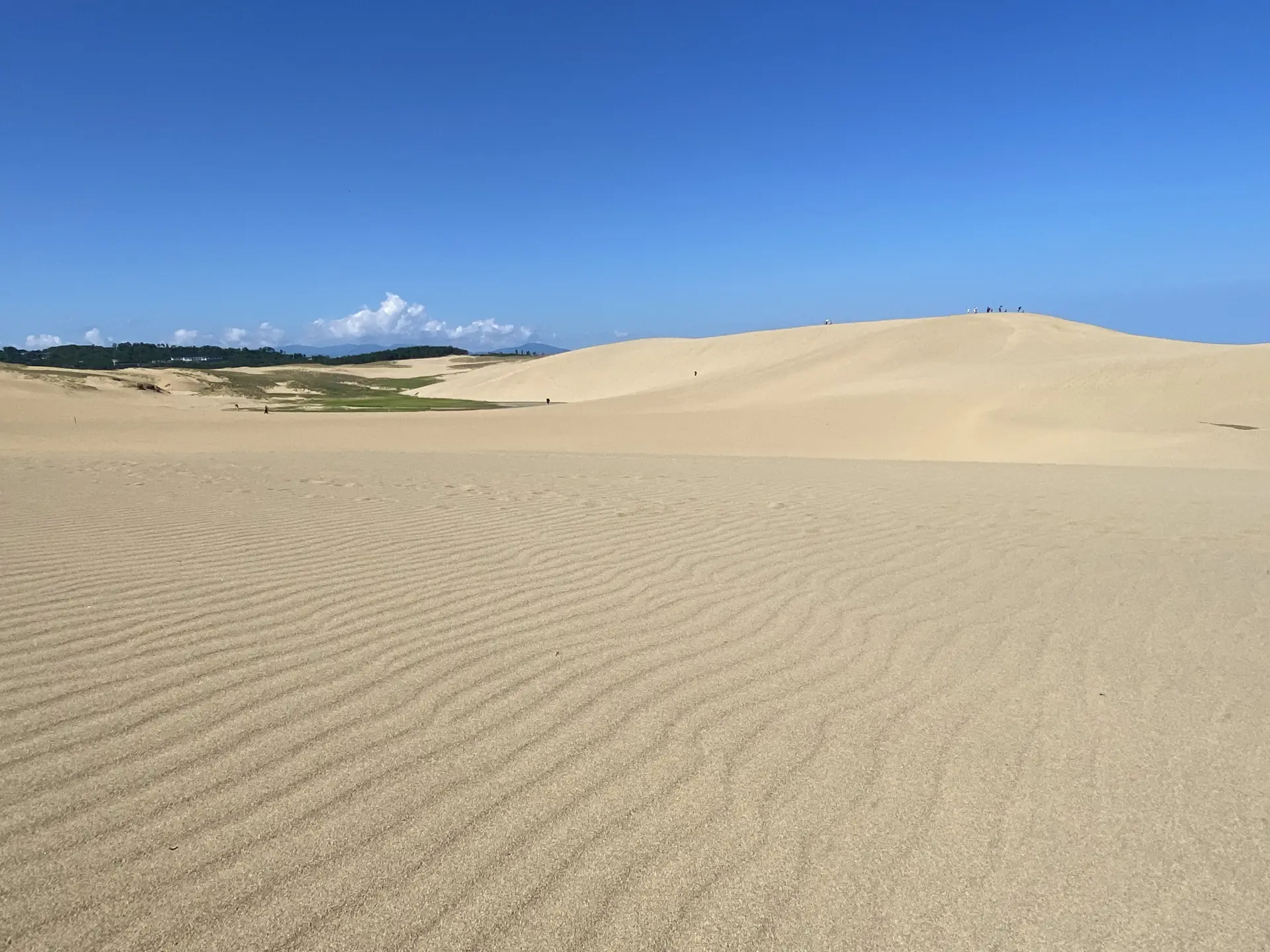
The wind-carved sand ripples, known as fūmon, are formed as the shifting sands move with the breeze.
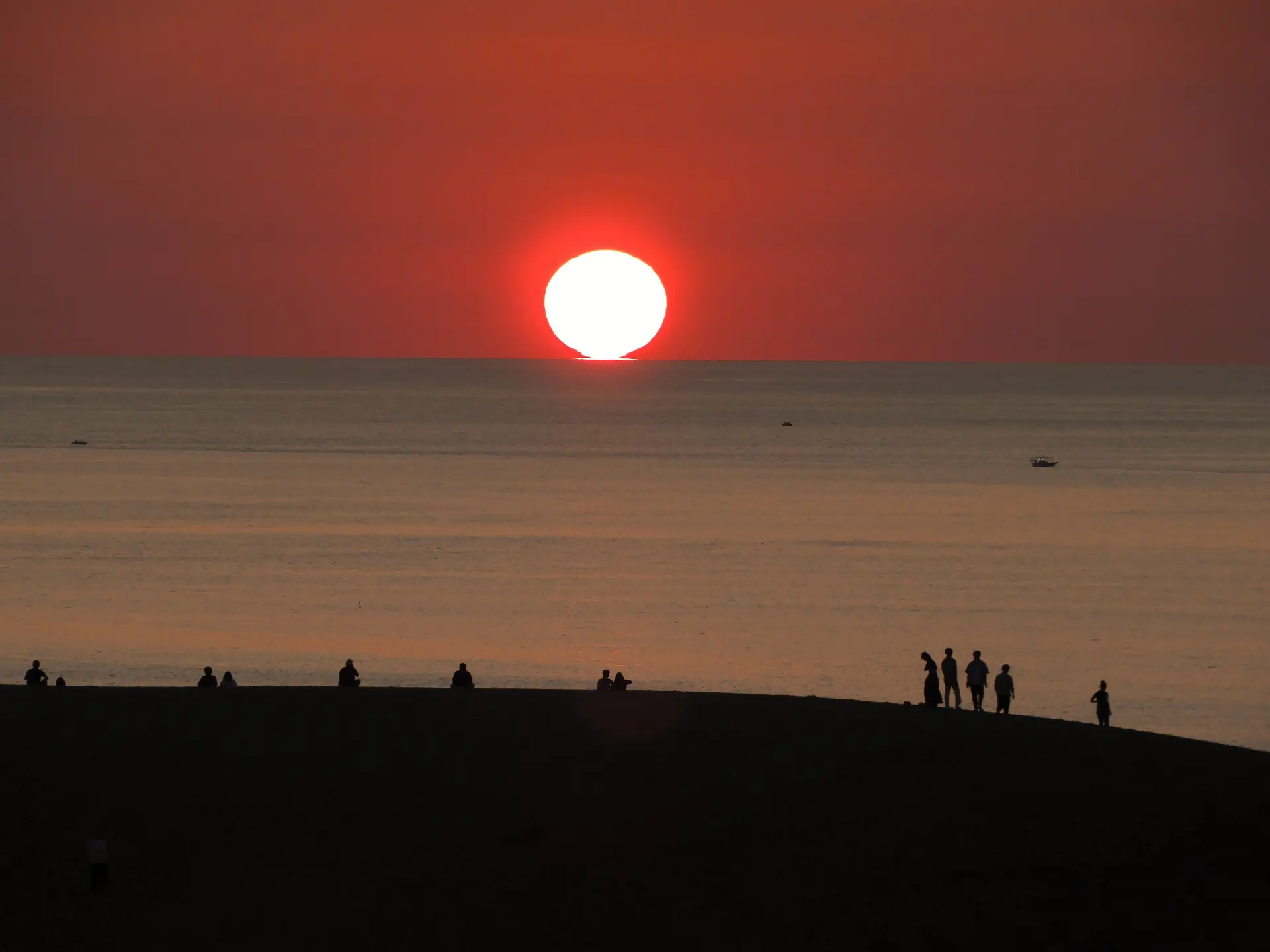
The golden sun glowing over the horizon as seen from the elevated “Umanose” sand ridge.
If your travels fall during the day like ours, know that an early morning brings a view of sand mostly untouched by footprints, while an evening trip comes kissed with the golden sunset over the dunes. Keep a pin on this spot to see the dunes at either ideal time of day.
Basic Information
- Name in Japanese
- 鳥取砂丘
- Postal Code
- 689-0105
- Address
- Fukubecho Yuyama, Tottori City, Tottori
- Telephone
- 0857-22-0021(Tottori Sand Dunes Visitor Center)
- Access
-
From JR Tottori Station, take the Sand Dunes Line bus and get off at Sakyu Kaikan (a short walk).
By car, it’s about 20 minutes from the Tottori IC on the Tottori Expressway. - Business Hours
- Open All Day
- Admission
- Free
- Closed
- Open every day
3:00pm – Truly Incredible Sand Sculptures at the Tottori Sand Dunes The Sand Museum
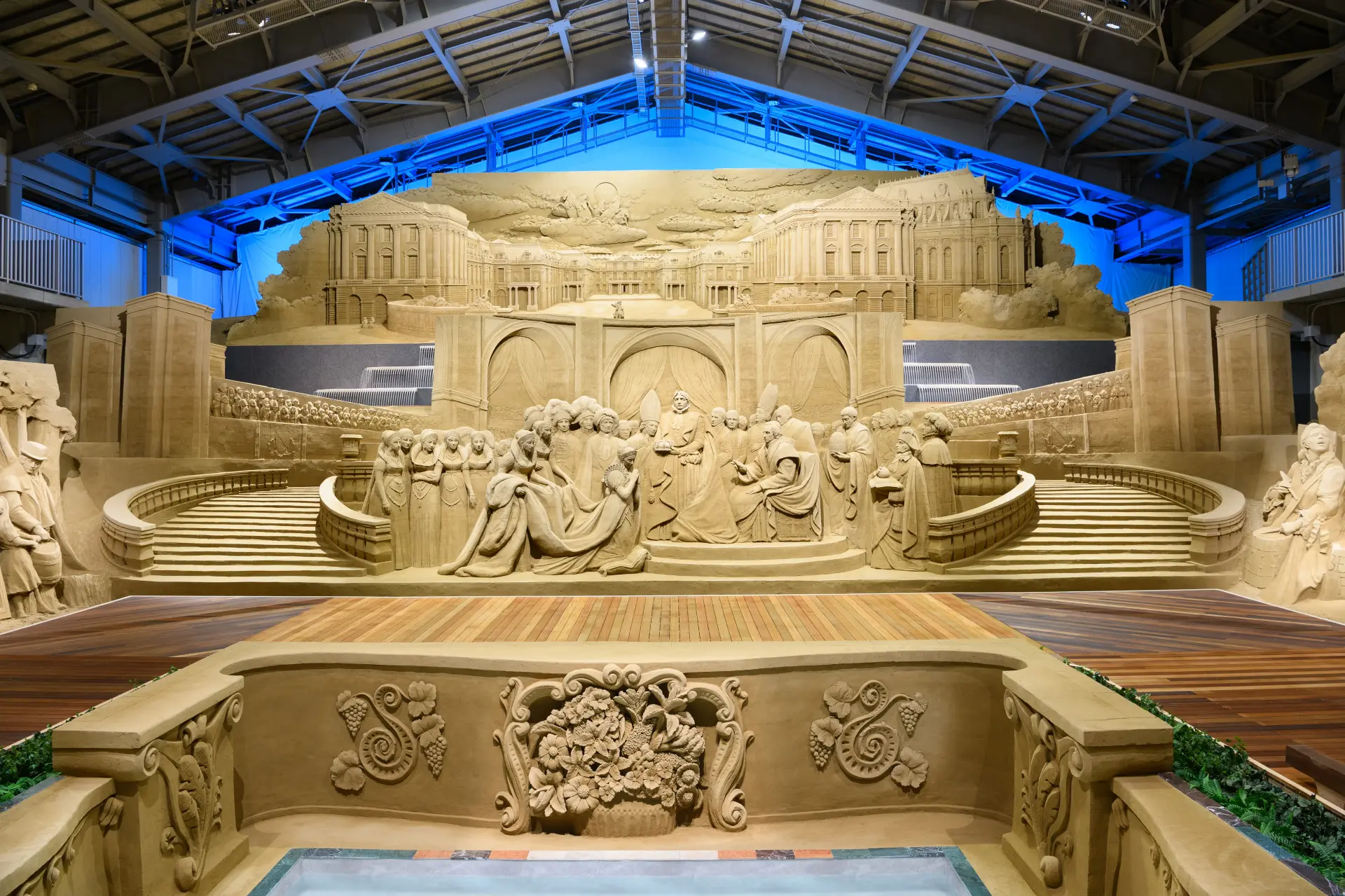
(C) Tottori Sand Dunes The Sand Museum
From April 19, 2024, to January 5, 2025, the exhibition "Travel the World in Sand: France Edition" will be on display.

(C) Tottori Sand Dunes The Sand Museum
The intricate beauty of the sculptures is so delicate that it’s hard to believe they were made using only sand and water.
After a mesmerizing stop at the gorgeous Tottori Sand Dunes, it’s time for a short three-minute drive to visit the world’s first museum dedicated to sand sculptures—the Tottori Sand Dunes The Sand Museum.
Since its opening in 2006, the museum keeps a showcase of intriguing sand sculptures in made to exhibit the idea of “Travelling the World in Sand”, with a new theme swapped out nearly every year. What’s truly astonishing is that these intricate sculptures are created using only sand from the Tottori Sand Dunes and water—without any adhesives or hardening agents. Once an exhibition ends, the sculptures are dismantled and returned to sand, which is then reused to create new works, making each exhibition a one-of-a-kind, limited-time experience. The realization that each work is truly fleeting makes them even more precious.
For its 15th edition, 20 sand sculptors from 12 countries have gathered to create masterpieces based on France. This year's exhibition captures the grandeur of aristocratic culture and architecture, represented by Versailles Palace, as well as the dramatic moments of history, including the Hundred Years’ War and the French Revolution.
The level of sand detail is astonishing, with realistic facial expressions, intricately carved hair strands, and lifelike textures that sing with unparalleled craftsmanship.
Basic Information
- Name in Japanese
- 鳥取砂丘 砂の美術館
- URL
- URL
4:30pm – Stay at Akashiya, A Tasteful Retreat for Fresh Seafood, Local Delicacies, and Relaxing Hot Spring Waters.
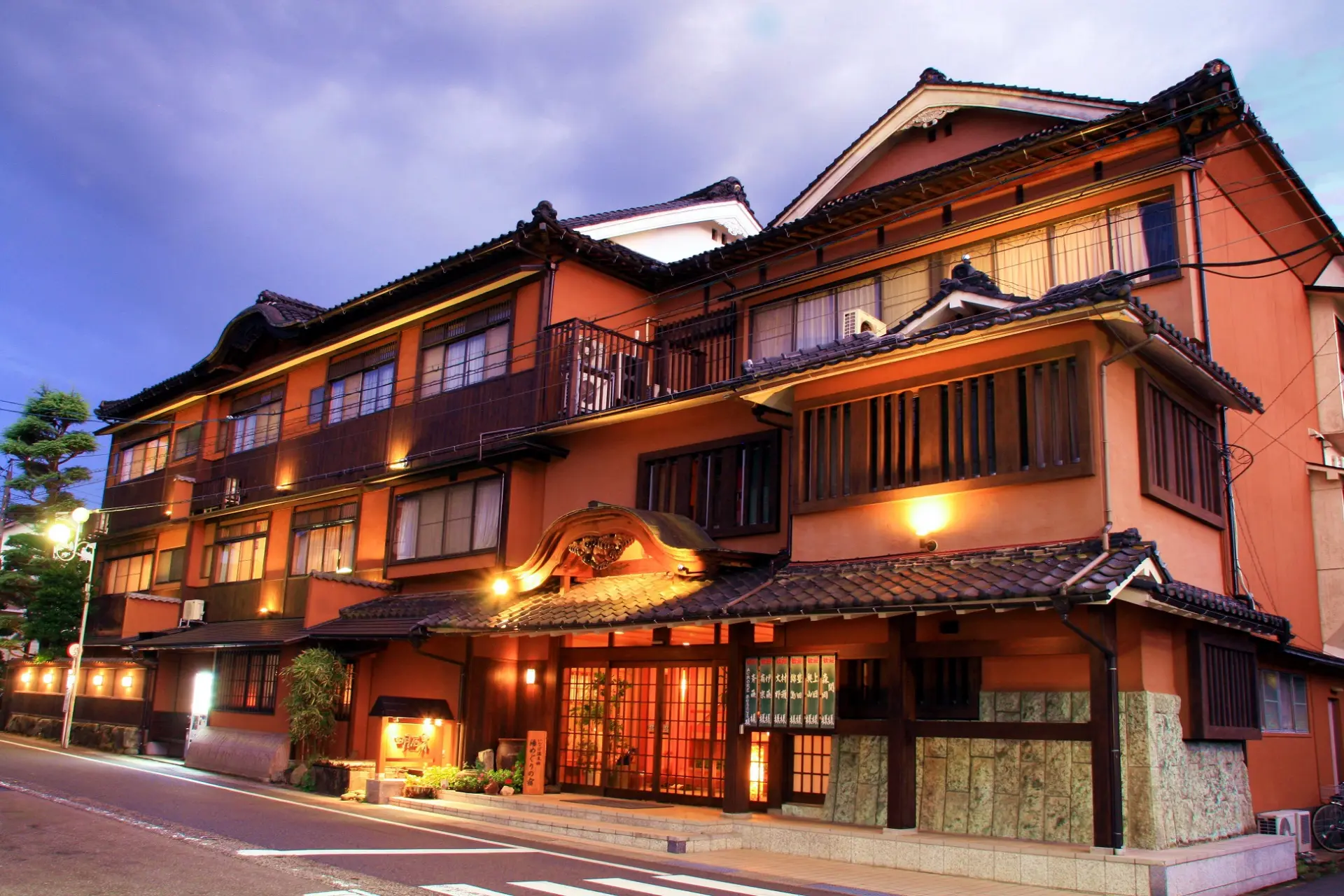
A three-story wooden building, reconstructed in the early Showa era, exuding a nostalgic charm and traditional elegance.
Bask in the world of art before taking a 20-minute drive to tonight’s stay.
Located in the Iwai Onsen district along the clear waters of the Gamou River, this historic ryokan (Japanese inn) has welcomed may a guest for over 400 years since its founding in the Edo period. The hot spring itself has a history of 1,200 years, and the inn has upheld the tradition of pure, free-flowing natural spring water ever since.
The main bathhouse, made entirely of Hinoki cypress, is available for both men and women. In addition, the inn features a garden-view open-air bath (closed from November to March), private open-air baths, and even a private sauna.
After an active first day—starting with a morning drive, exploring the vast Tottori Sand Dunes, and admiring the sand sculptures—soaking in the soothing hot spring was the perfect way to melt away any travel wears.
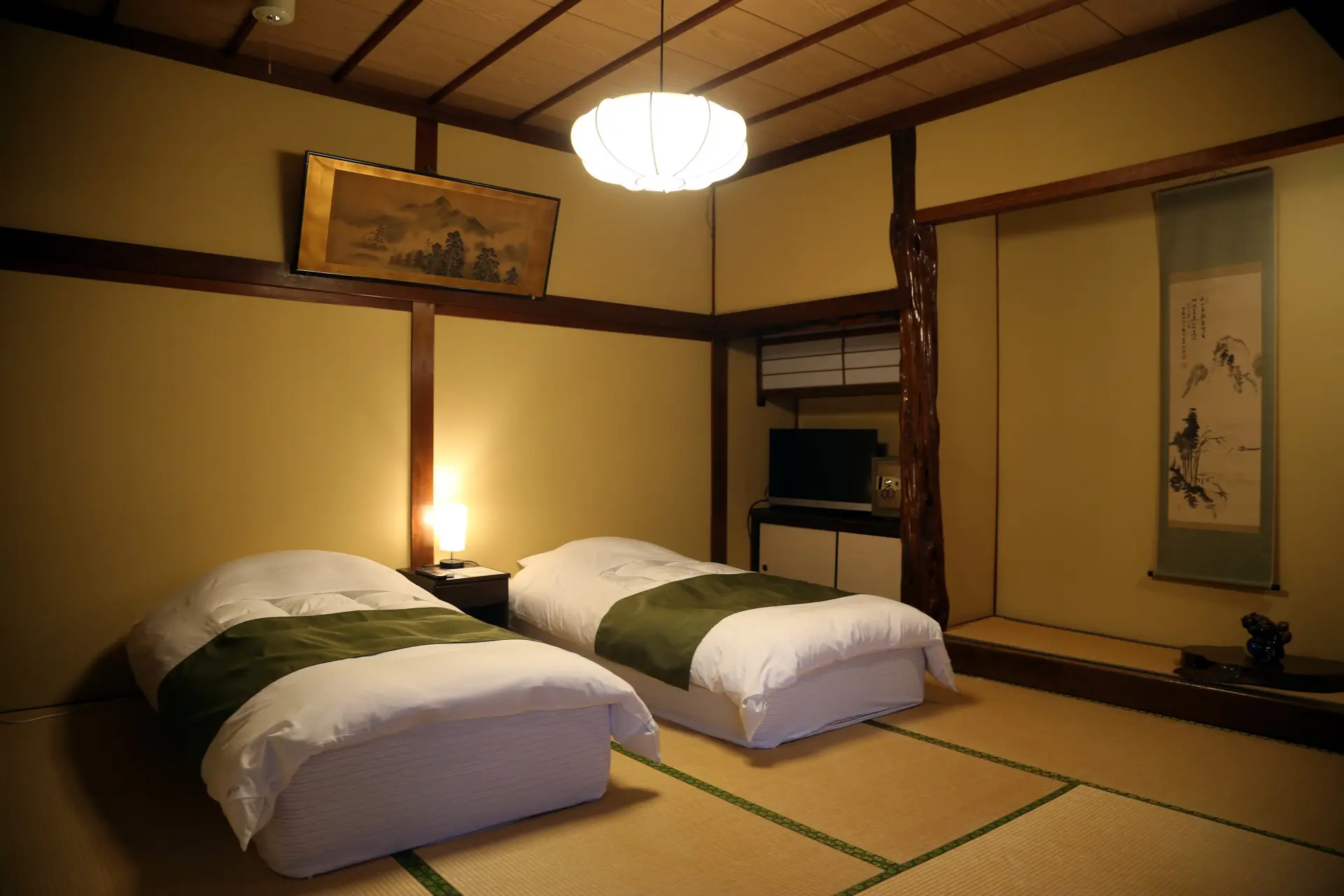
3 types of rooms for all your travel needs: an authentically designed Sukiya-style room, mixed Japanese-style room with western bed and ultra luxe room with en suite open air bath.
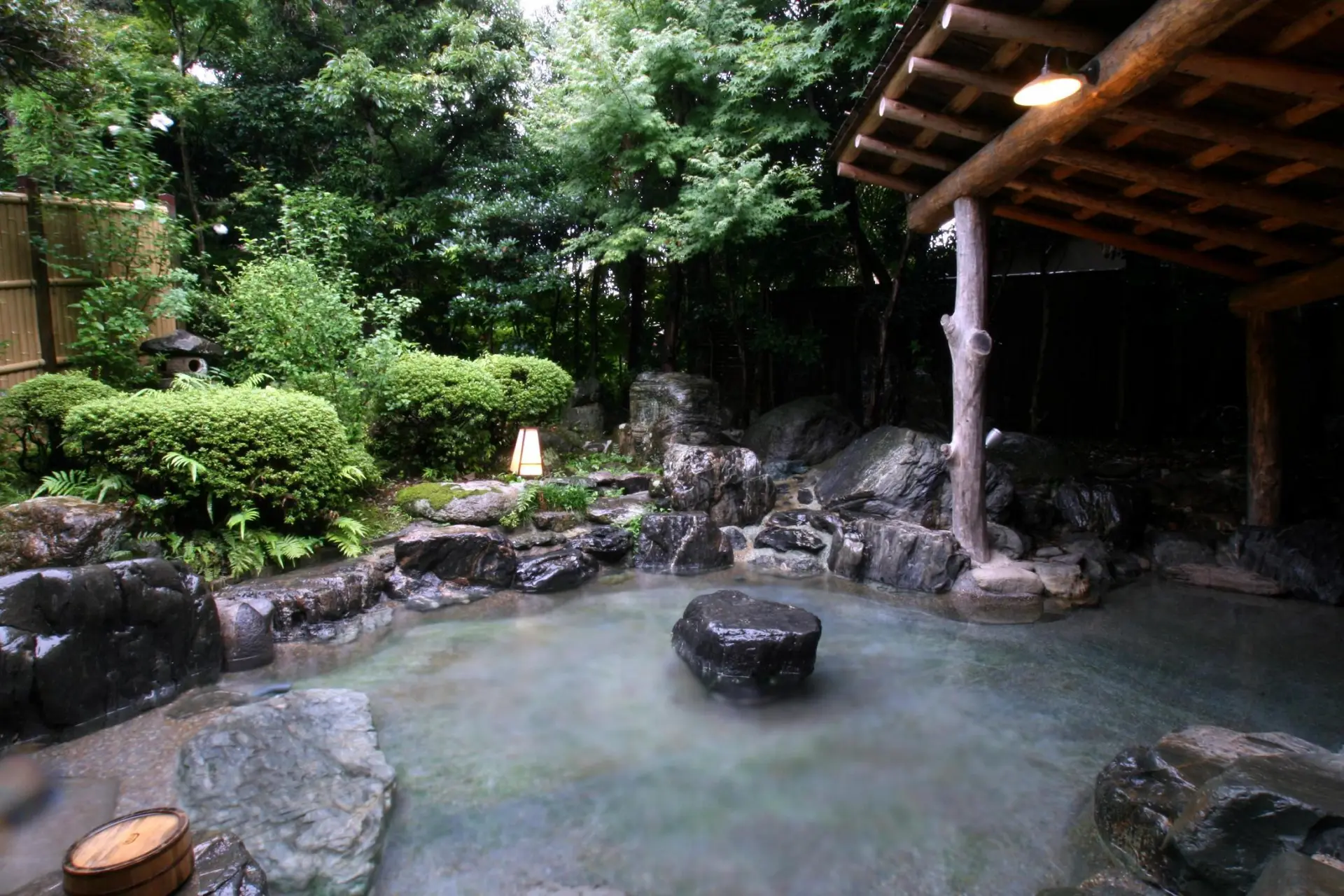
The hot spring features a calcium-sodium sulfate spring, known for its smooth, silky water that leaves the skin feeling soft, hydrated, and refreshed.
The cuisine is just as impressive, offering a carefully curated selection of seasonal delicacies from the Inaba region, featuring both fresh seafood and mountain specialties.
For seafood, the fish is purchased fresh that morning from Ajiro Port in Iwami Town, ensuring the highest quality. For meat dishes, the ryokan serves Tajima’s renowned Tamura Beef, known for its exceptional flavor and tenderness.
One of the standout dishes is the abalone kaiseki course, where live abalone is taken directly from the tank and grilled to perfection right on the wire mesh. This luxurious delicacy, only possible due to its extraordinary freshness, makes for an unforgettable dining experience.
This feast of local tastes is a sumptuous cap to a blissfully full day.
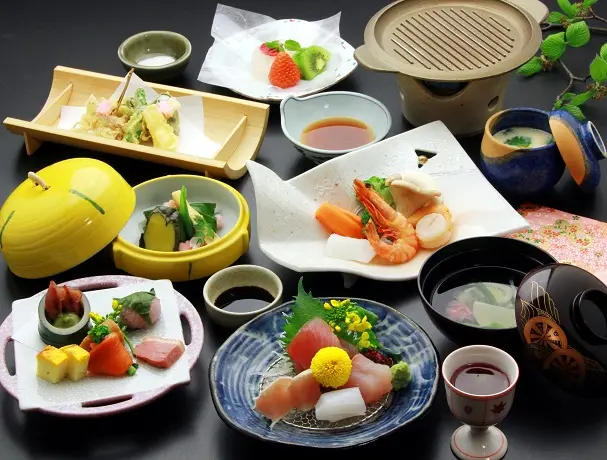
The dining menu features three kaiseki courses that offer a perfect balance of fresh seafood, local mountain delicacies, and seasonal ingredients, along with a seasonal limited kaiseki course that highlights the finest regional specialties at their peak.
Basic Information
- Name in Japanese
- 明石家
- Postal Code
- 681-0024
- Address
- 536 Iwai Iwamicho, Iwamigun, Tottori
- Telephone
- 0857-72-1515 (Available from 8:00pm to 8:00pm)
- Access
-
From JR Tottori Station, take a Nihon Kotsu Bus to Iwai Onsen (a short walk from the stop).
By car, it’s about 30 minutes from the Tottori IC on the Tottori Expressway. - Hours
- Check-in 3:00pm - 6:00pm / Check-out by 10:00am
- Accommodation Fee
- From 19,800yen per person (based on double occupancy).
- Closed
- Irregular holidays
- URL
- URL
DAY2
10:00am – Depart from Akashiya!
Day 2 launches with a smooth checkout at the ryokan followed by a 15-minute drive to the highlight of this trip—the Uradome Coast Island Cruise!
10:15am – Cruise Along the San’in Coast on the "Uradome Coast Island Tour Boat"
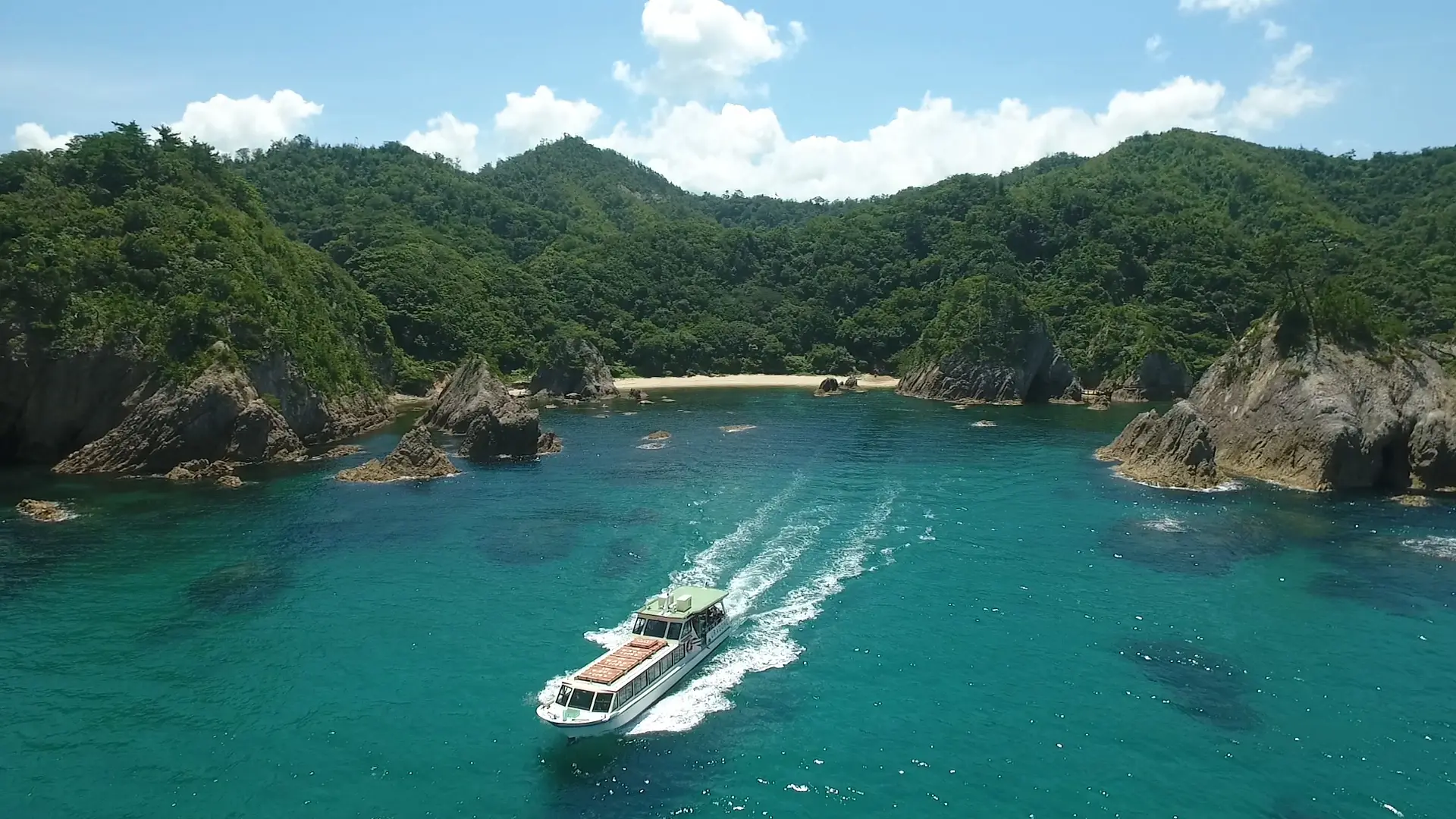
Experience the stunning "Iwami Blue" waters up close, boasting an incredible 25-meter depth transparency, allowing you to fully appreciate the crystal-clear beauty of the sea.
The Uradome Coast is a breathtaking stretch of shoreline, shaped over time by the powerful waves of the Sea of Japan and harsh winter winds, creating a landscape dotted with islands of all sizes. Taking a sightseeing cruise along this dramatic coastline is the most exciting highlight of this trip!
Once on board your eyes are treated with a full frame of massive rock formations, towering cliffs, and the true thrills of nature’s sheer power.
Some of the must-see sights include Sengan Matsushima, a striking rock formation with a pine tree growing at its peak, as well as Shirahama Coast, known for its coarse-grained sandy beaches. The cruise also offers views of the smooth, rounded boulders of Enishi no Isohama, the wave-cut rock terraces of Shirohara Coast, and the intricate inlets of Kamogaiso, each revealing the rugged beauty of the San’in Kaigan Geopark from the sea.
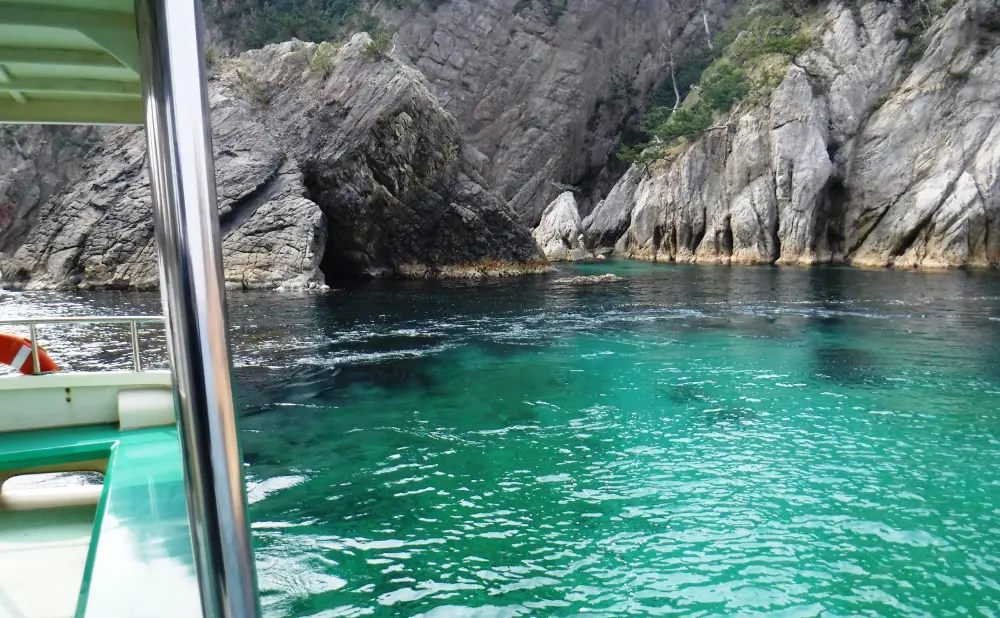
The sheer might of nature as it commands massive rock formations and uniquely shaped cliffs that can only be seen from the cruise.
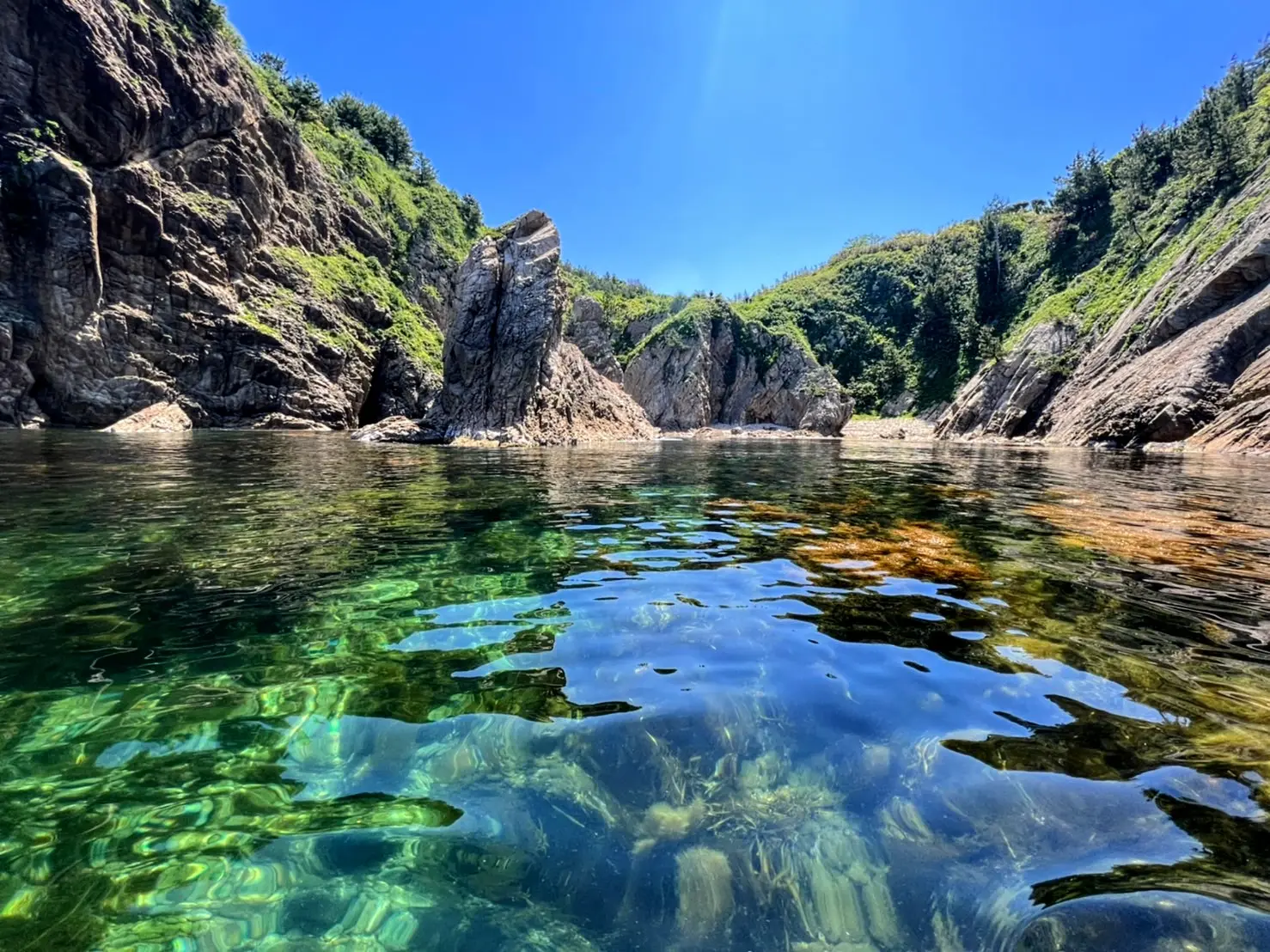
The undeniably crystal-clear waters of Uradome Coast in a vibrant shimmer of green.
The sightseeing boat is built with the helm and a prime spot for the captain at the center, ready to detail the massive rock formations and unique cliffs with an extra fun spin and new perspective as you take in the view from the sea. Total cruise tiem is about 40 minutes, meaning there’s plenty of chances to take in all the splendor of Iwami Blue, a mesmerizing blend of emerald green and cobalt blue here in one of Honshu’s clearest waters. The glimmering paradise is sure to blow you away.
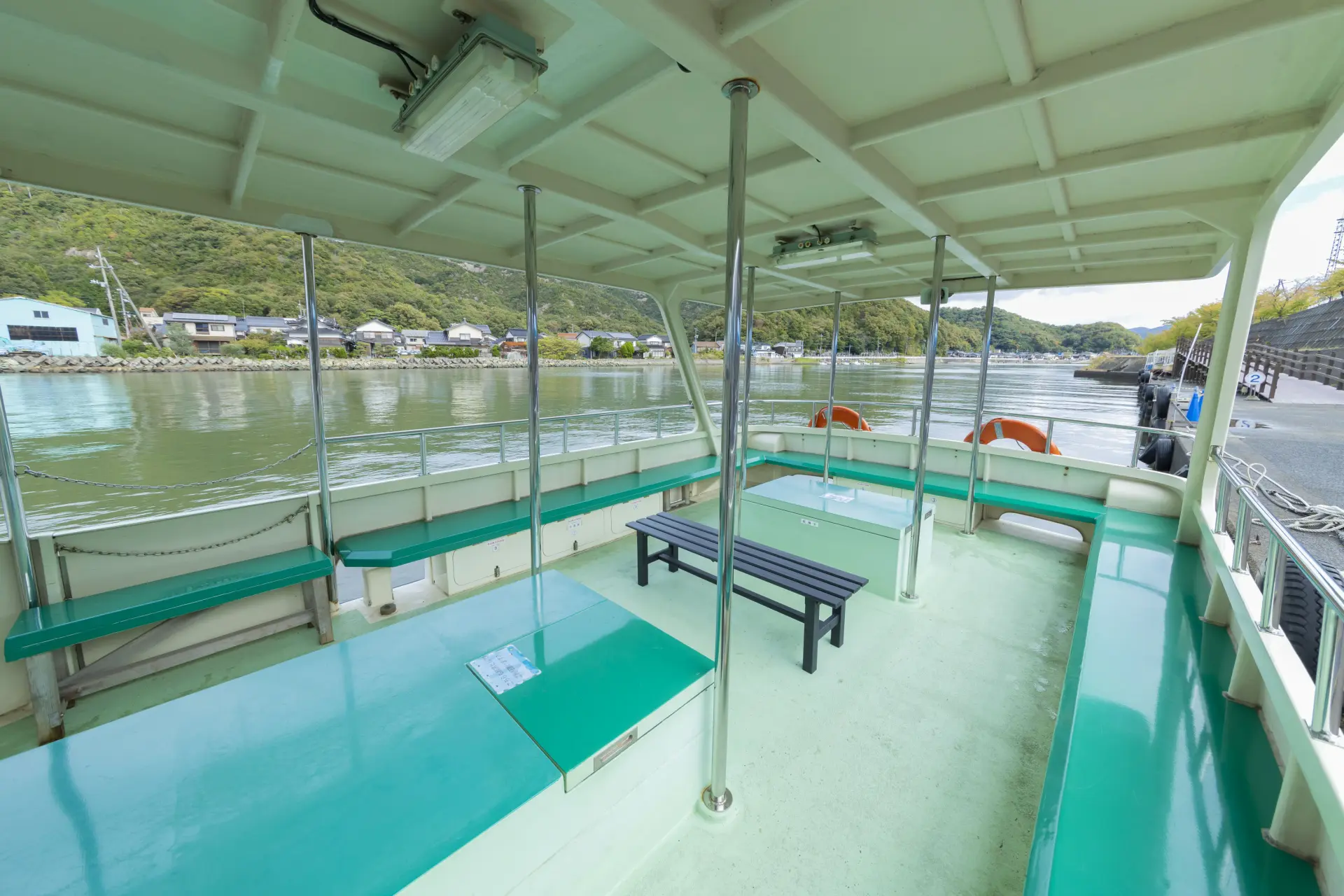
Room for up to 95 aboard the sightseeing boat. Bench-style seats plus an open deck at the rear for guests looking to take in the views and open breeze.
Basic Information
- Name in Japanese
- 浦富海岸島めぐり遊覧船
- URL
- URL
11:30am – Seafood Lunch at "Ajirōya" After the Cruise
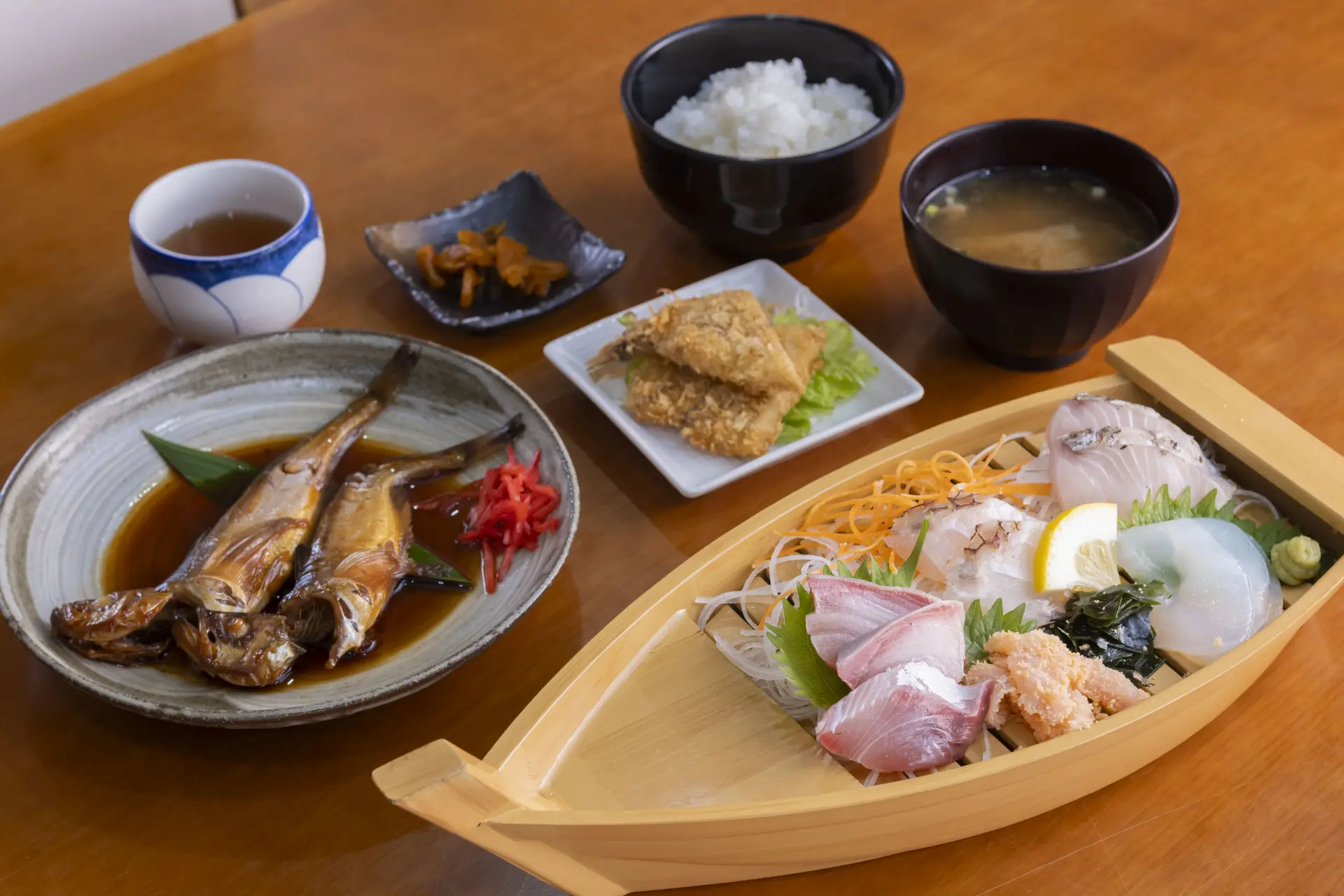
A luxe set of ocean delights and sushi set in a boat-shaped dish. Includes braised fish, fried seafood, soup, and pickled vegetables.
Next up is a stop for lunch at a local seafood shop found just near the sightseeing boat information center. Inside you’ll find the proud flags of different fish hanging from the ceiling, leaving now doubt that you’re in for true-blue coastal dining.
A fan favorite here is the Seafood Set, a sumptuous meal where seasonal seafood bites are prepared in the best way known for that ingredient. The meal features a beautifully arranged sashimi platter, perfectly braised fish, and crispy fried seafood, offering a variety of flavors and textures in one satisfying meal.
Even the soup is made using the freshest seafood of the season, whether it's a rich shellfish broth or a flavorful fish head soup. Each bite brings a tasteful foray into the season’s best seafood and a little inspiration to keep you on your journey along the coast.
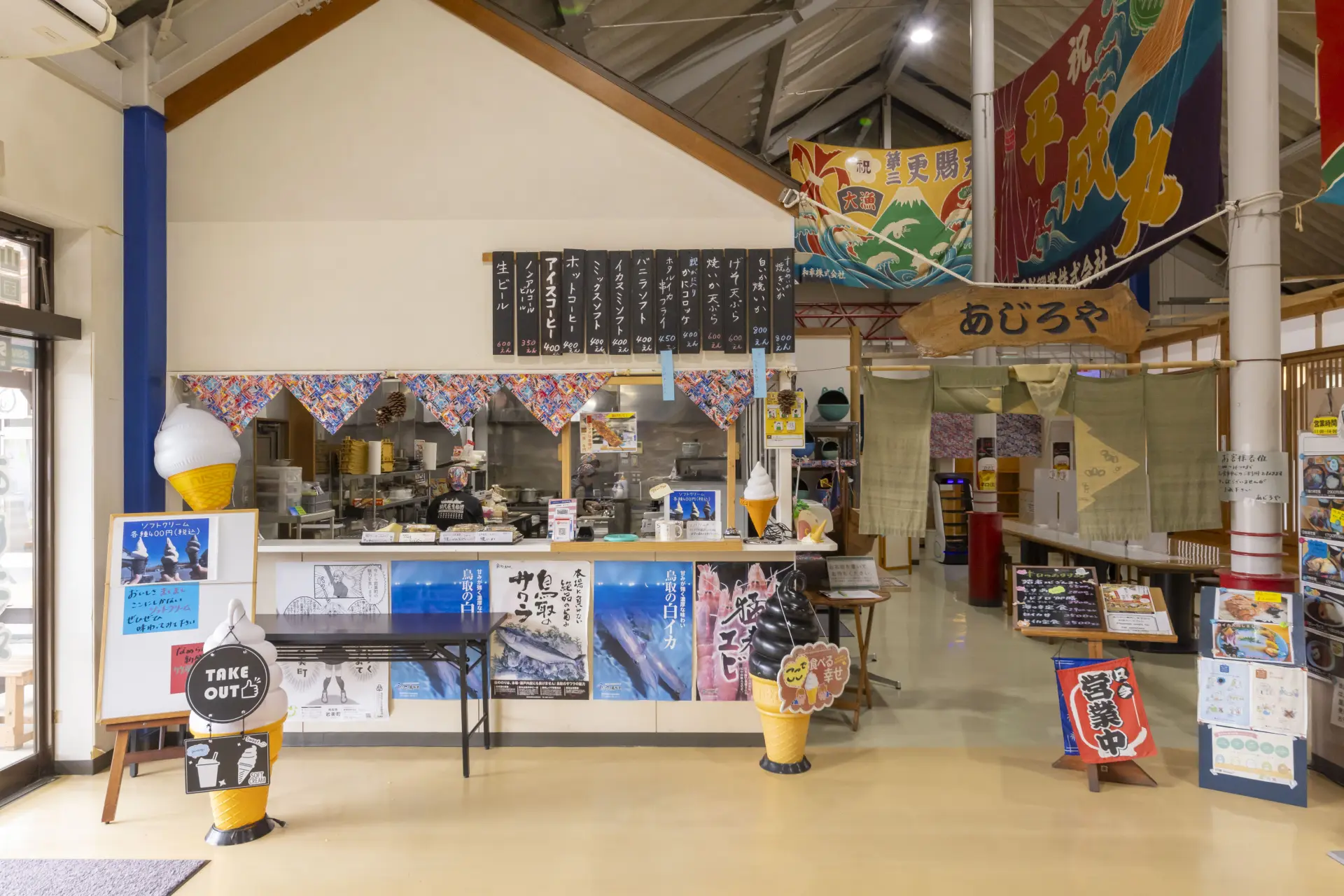
Seats up to 60 across counter, table, semi-private and floor seating spaces.
One of Tottori's rising local specialties is the Mosaebi, often called the "phantom shrimp" due to its rarity. Available only during limited seasons from March to May and early September to mid-November, you’ll find this bite has gained a devoted following. We’ve already made a pact to come back for Mosaebi specifically.
Basic Information
- Name in Japanese
- お食事処あじろや
- Postal Code
- 681-0073
- Address
- 2182 Otani, Iwamicho, Iwamigun, Tottori
- Telephone
- 0857-73-1212 (Uradome Coast Island Tour Boat)
- Access
-
From JR Tottori Station, take the Iwami Iwai Line bus and get off at Shima Meguri Yūransen Noriba-mae (right in front of the sightseeing boat terminal, a short walk).
By car, it’s about 25 minutes from the Tottori IC on the Tottori Expressway. - Business Hours
- 11:00am - 2:00pm
- Closed
- Tuesdays
- URL
- URL
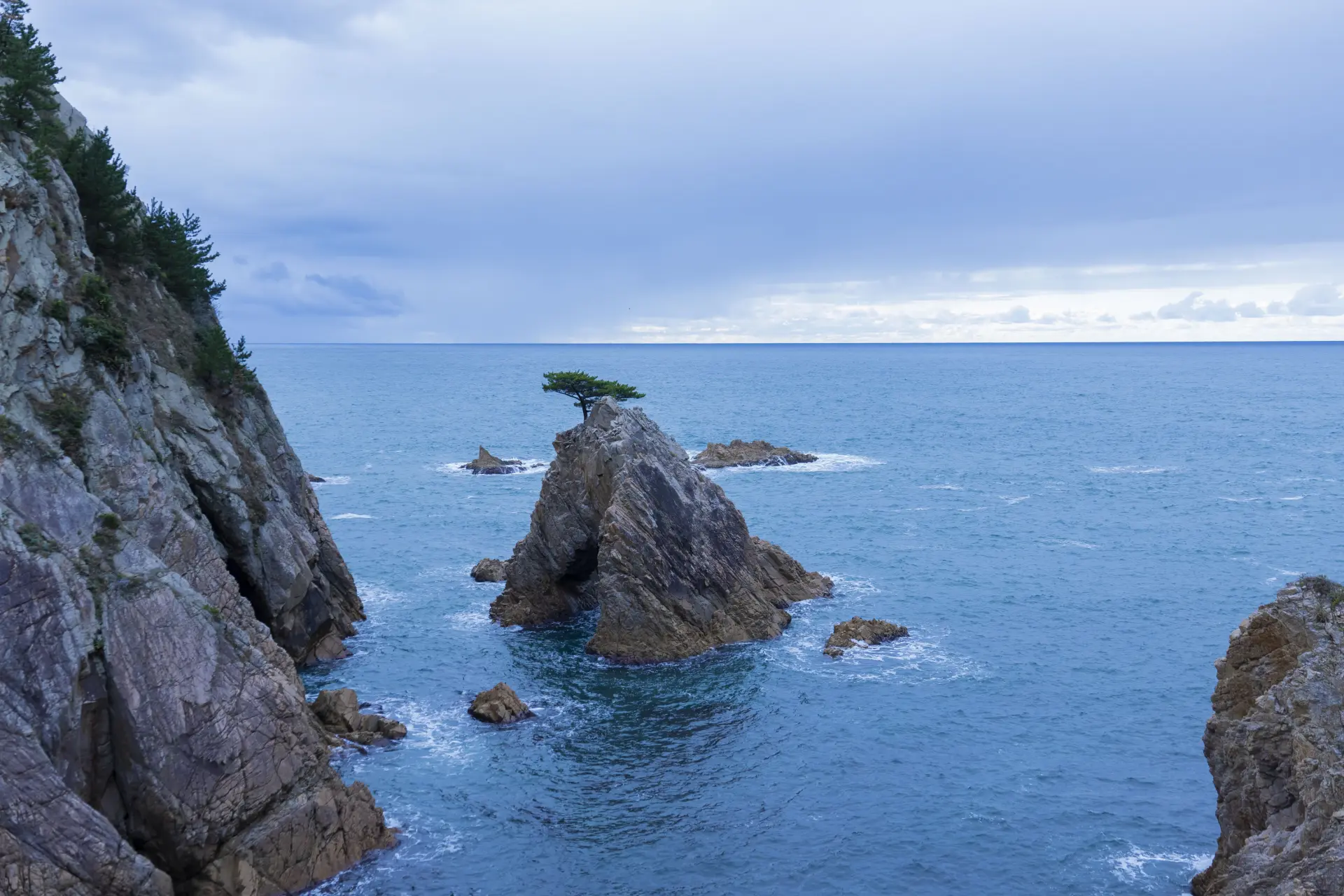
Unforgettable panoramas from the deck out over Sengan Matsushima.
After hitting the road again after Ajiroya there’s a scenic viewpoint that’s worth getting out and checking for its views of Sengan Matsushima. Take to the steep mountain path, a known part of the Chūgoku-Kinki Nature Trail, for about 5 to 10 minutes in a quick jaunt that’s worth the stop. The view will slowly begin to reveal as you approach the viewing deck, offering a view of the towering rock and single pine of Sengan-Matsushima as it stands tall in the crystal sea.
1:00pm – Unravel the ancient history at the San'in Kaigan Geopark Museum of the Sea and Earth.
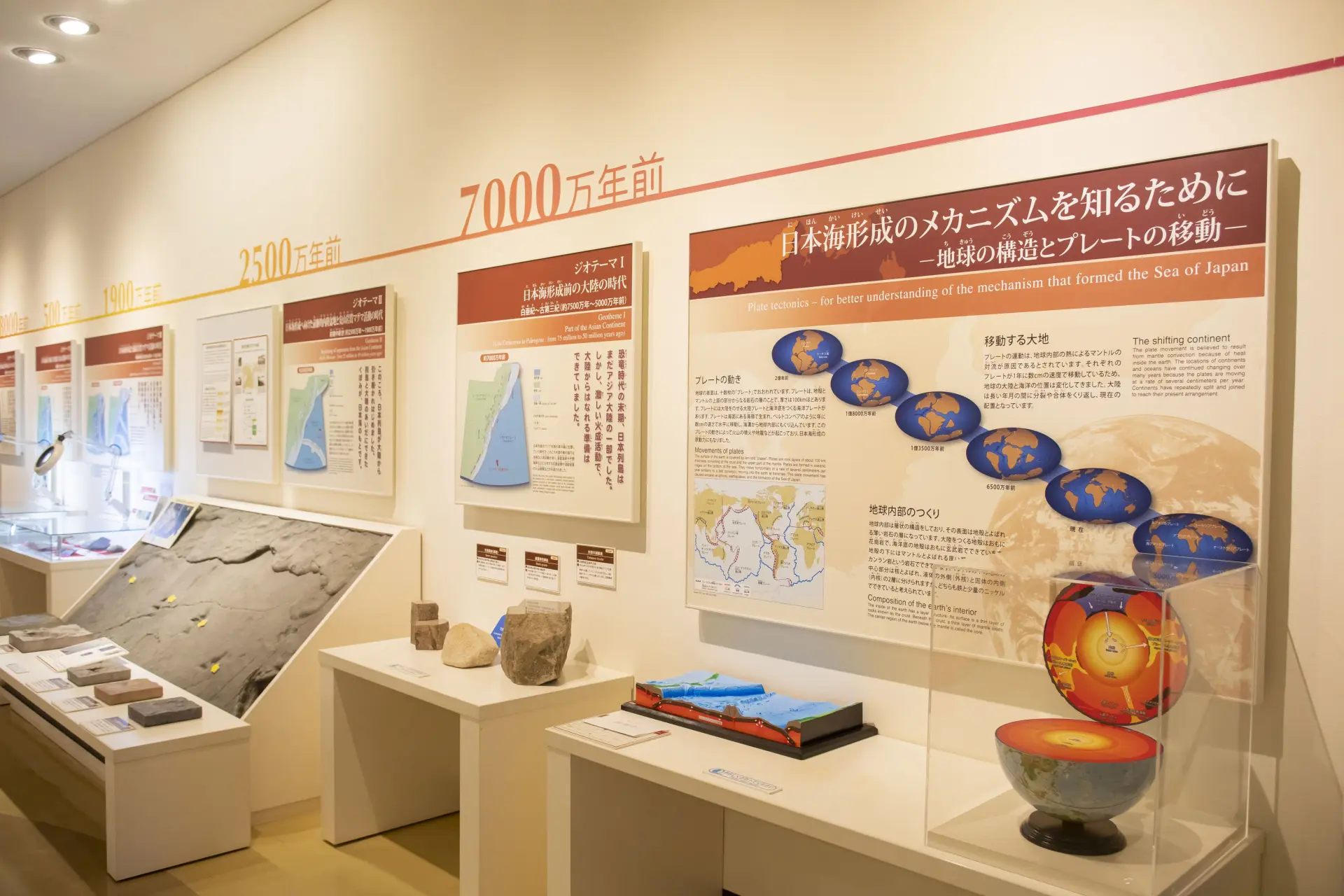
A hub for deep dives into the San'in Kaigan Geopark.
A geopark is a region that promotes education and tourism while preserving geological heritage, local ecosystems, and human lifestyles. In Japan, 47 areas have been certified by the Japan Geopark Network, and among them, 10—including the San'in Kaigan Geopark—have been designated as UNESCO Global Geoparks.
Next up is a specific destination that introduces the San'in Kaigan Geopark through a variety of exhibits, including videos and informational materials.
Step inside and behold a tank with many marine friends native to the nearby waters. The exhibition hall provides documents, 3D models and detailed corners expounding upon Japan’s geological history, from the time when the Japanese archipelago was part of the continent to the formation of the Sea of Japan. It also showcases valuable geological and geomorphological heritage, including igneous rocks and stratified formations associated with this transformation.
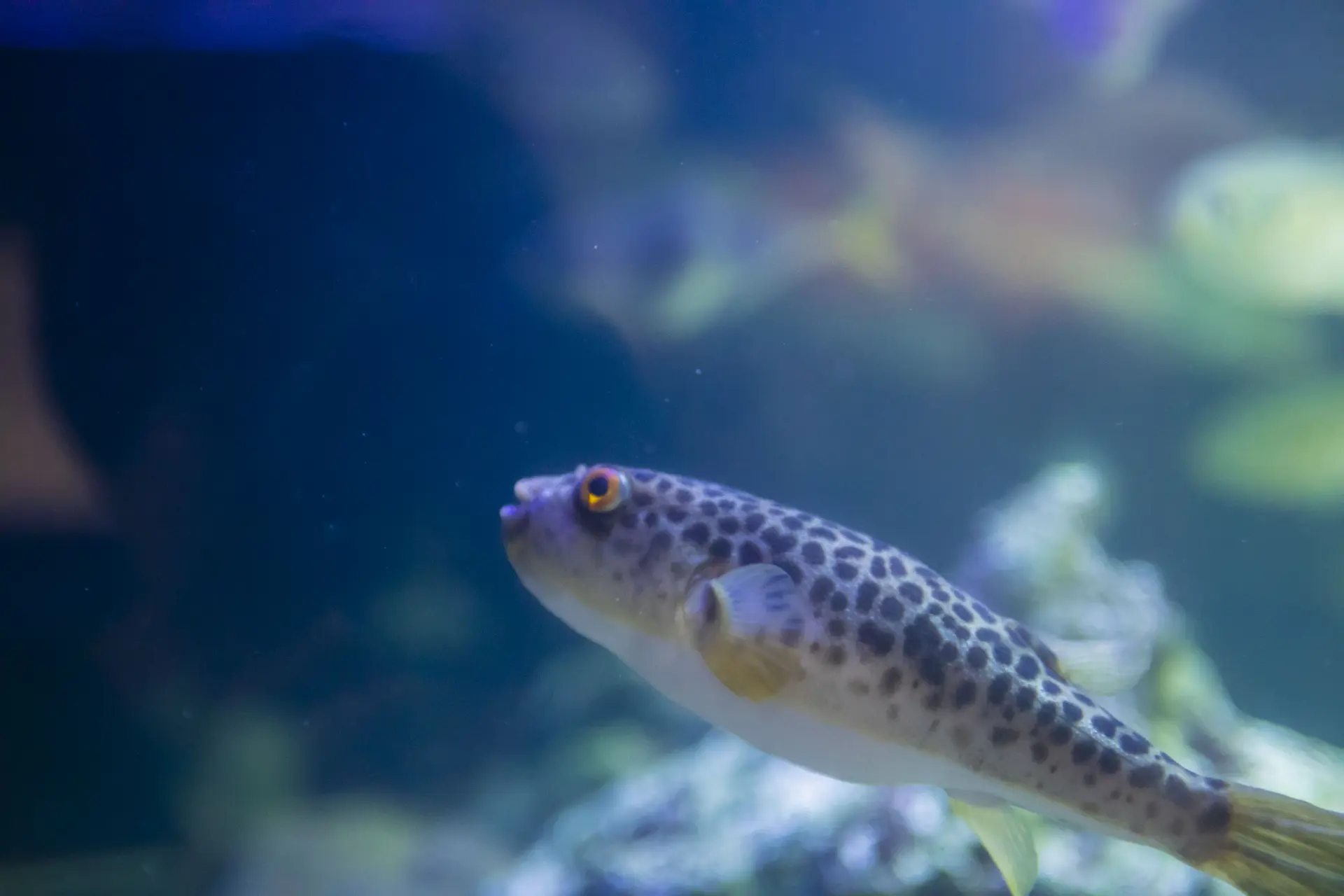
40 to 50 species from local waters at anytime in the aquarium tanks.
A preserved specimen of a giant squid, accidentally caught alive offshore, is an awe-inspiring sight. Measuring 3 meters in length, its imposing presence evokes the mysteries of the deep sea. The experience is further enriched by a 3D theater, where visitors can enjoy immersive films such as The Story of the Land and Sea, The Story of Mystery and Life, and The Story of the Land and People. With each screening lasting about 20 minutes, guests can deepen their understanding of the region’s geological and ecological wonders while enjoying a visually engaging presentation.
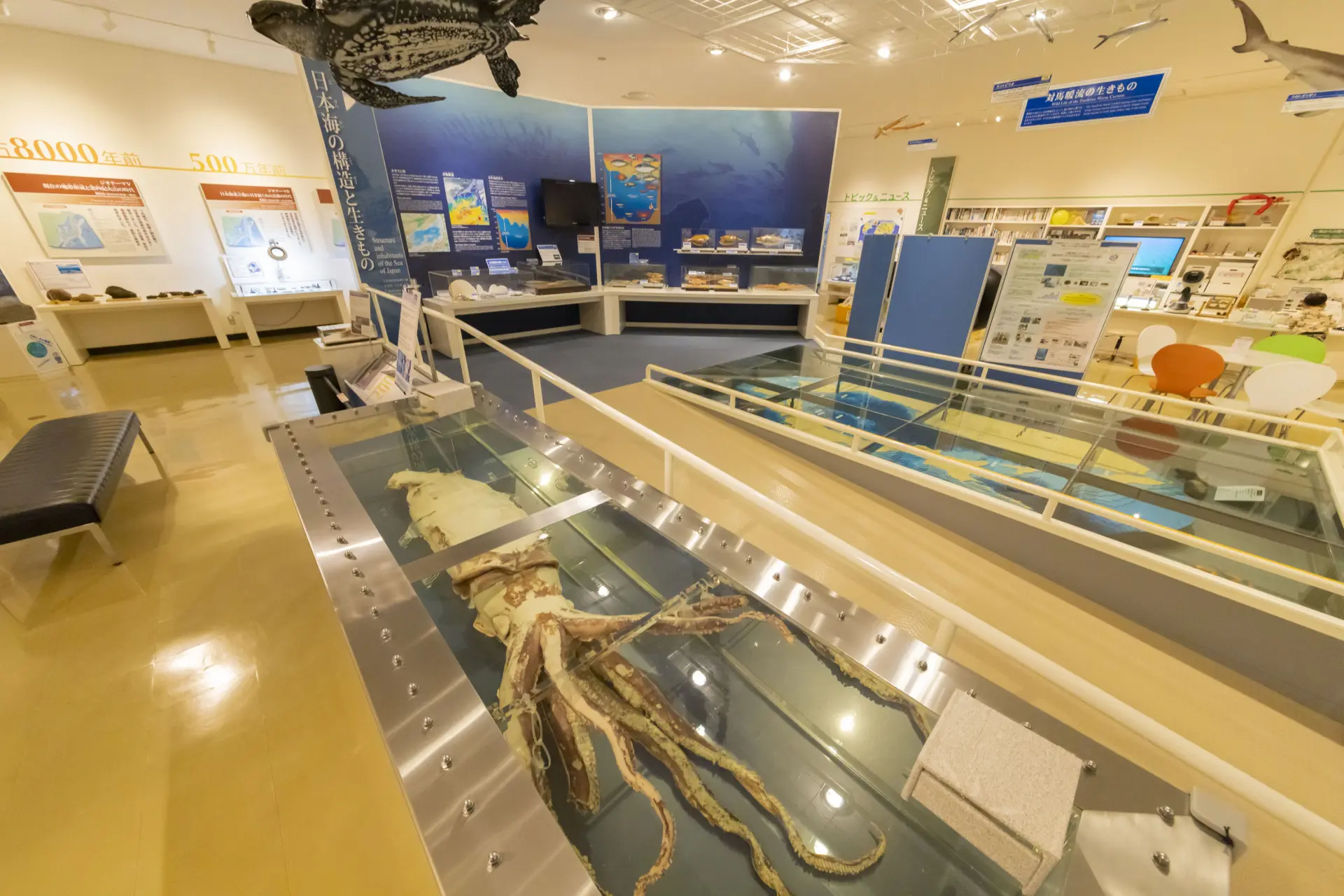
Taxidermy of different varieties to see up close in the exhibition room.
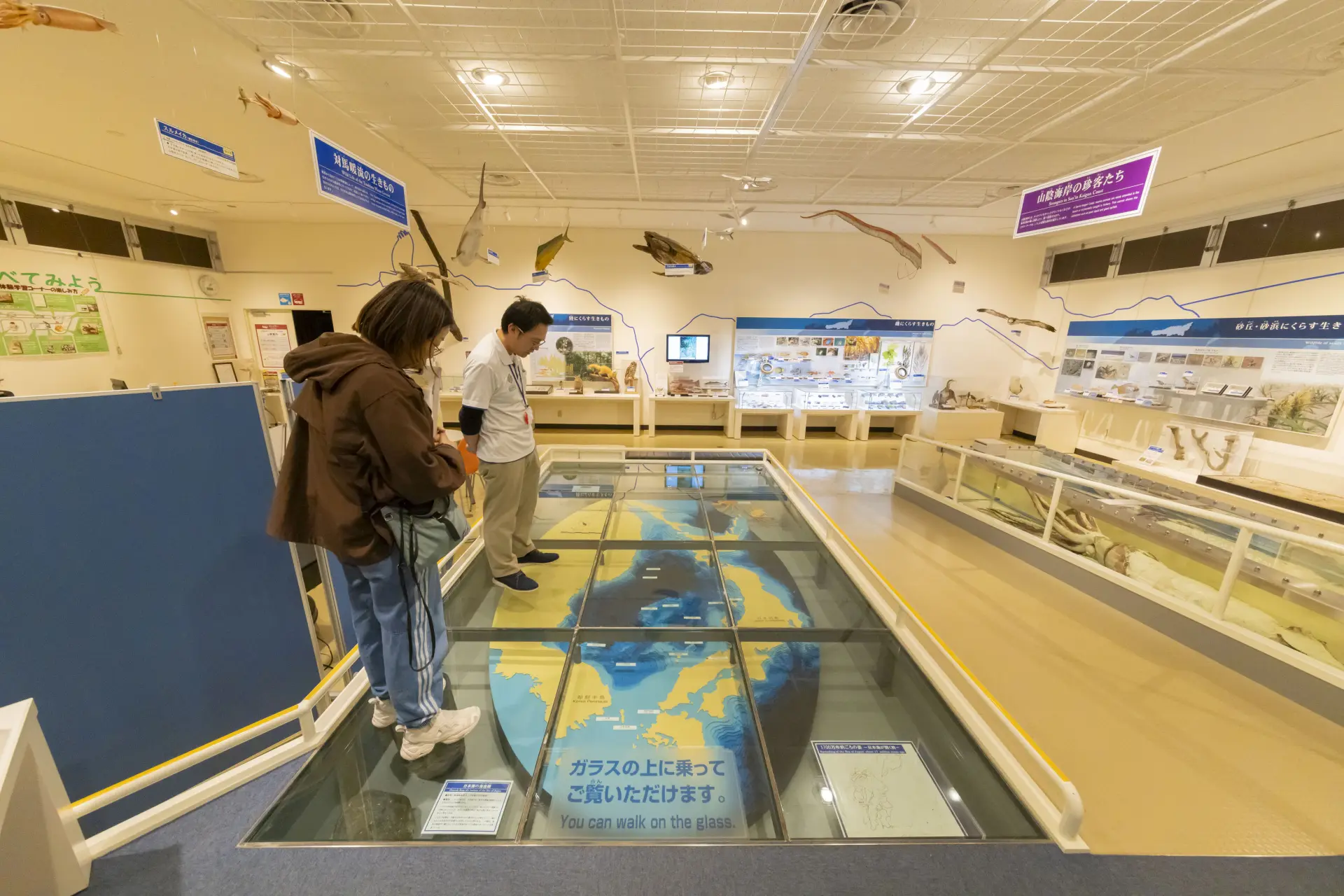
Explanations in your preferred language is smoother here thanks to multilingual staff.
Basic Information
- Name in Japanese
- 山陰海岸ジオパーク海と大地の自然館
- Postal Code
- 681-0001
- Address
- 1794-4 Makidani, Iwamicho, Iwamigun, Tottori
- Telephone
- 0857-73-1445
- Access
-
From JR Tottori Station, take the Iwami-Iwai Line local bus to Uradome, then walk for about 20 minutes.
Alternatively, if traveling by car, it takes approximately 30 minutes from Tottori IC on the Tottori Expressway. - Business Hours
- 9:00am - 5:00pm
- Admission
- Free
- Closed
-
Mondays (If it is a national holiday, the next day is closed)
*From July 20 to August 31, the facility remains open every day with no closure days. - URL
- URL
2:10pm – Take in the breathtaking panoramic views of the sea, mountains, and village from Higashihama Observatory.
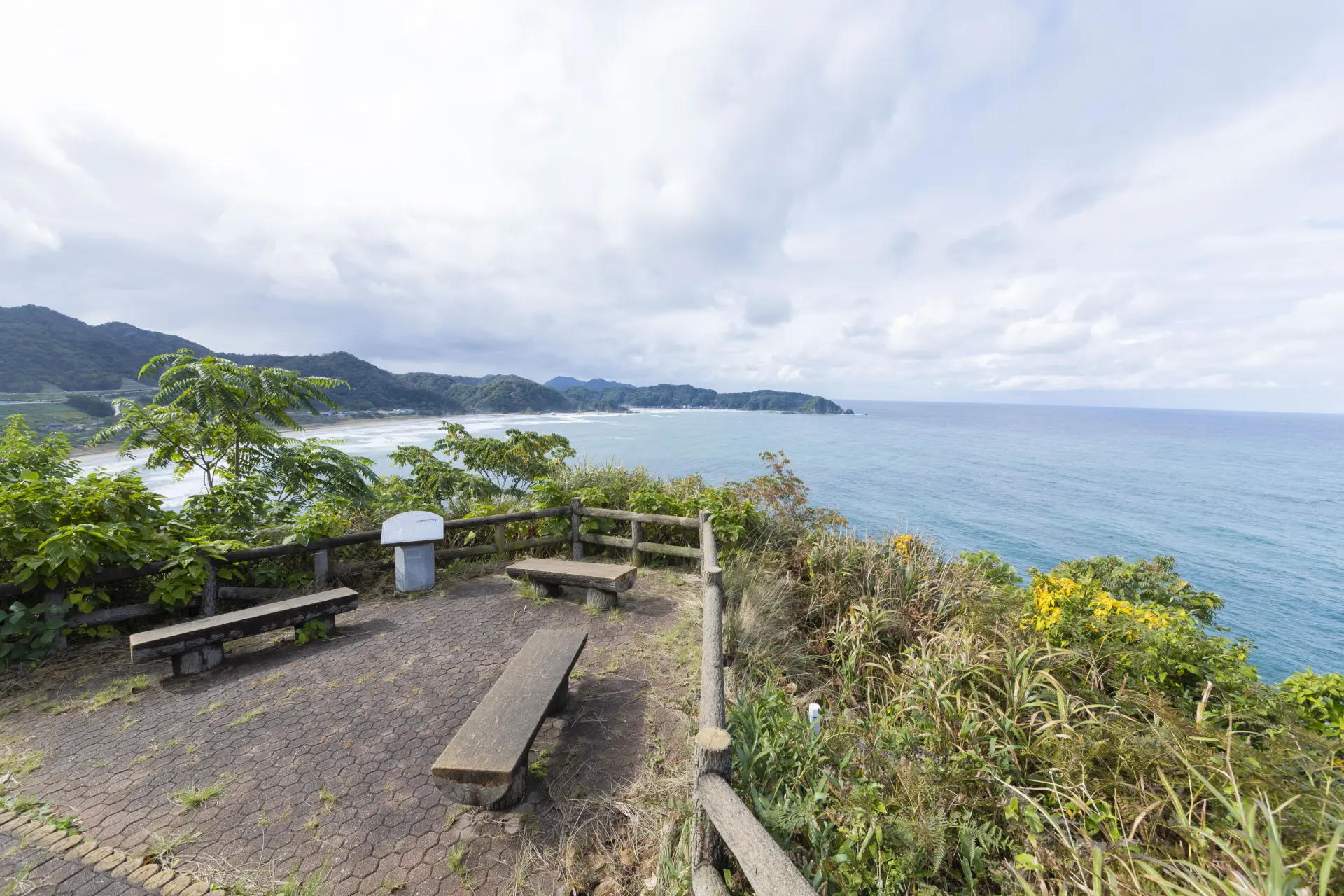
Panoramic view of Uradome Coast, a designated site within the San'in Kaigan Geopark.
This journey comes to a close with a final stop to take in the nature-rich backdrops of the San'in Kaigan Coast at Higashihama Observatory, located at the easternmost point of Uradome Coast, near the border with Hyogo Prefecture.
From this vantage point, the untouched charm of the coastal village of Higashihama, the sweeping curve of the white sandy beach stretching from Higashihama to Higashi Fishing Port, and Haneo Cape, home to Ryujin Cave, the largest sea cave along the San'in Coast all come in frame. The site is also famous for its stunning sunsets. As we gazed at the grand panorama—the ridgeline of the Chūgoku Mountains and the endless horizon—we reflected on the beauty of this unforgettable journey.
Basic Information
- Name in Japanese
- 東浜展望所
- Postal Code
- 681-0001
- Address
- Kugami, Iwamicho, Iwamigun, Tottori
- Telephone
- 0857-72-3481 (Iwamicho City Tourist Association)
- Access
-
About 30 minutes on foot from JR Higashihama Station
Approximately 35 minutes by car from Tottori IC on the Tottori Expressway. - URL
- URL
Wrap-up
The Tottori Sand Dunes, one of the largest in Japan, and the untouched natural beauty of the San'in Kaigan Coast offer an awe-inspiring landscape. Standing before such vast, breathtaking scenery, you can feel a deep sense of tranquility, as if your mind and body are made anew. This natural beauty, shaped over tens of thousands of years, has a remarkable healing effect.
Visiting nearby facilities that introduce the sand dunes and geopark further enhances the experience, providing deeper insight into the region’s unique geological and ecological significance. Why not explore the area for yourself and experience the sheer power and grandeur of nature firsthand?
Check also...
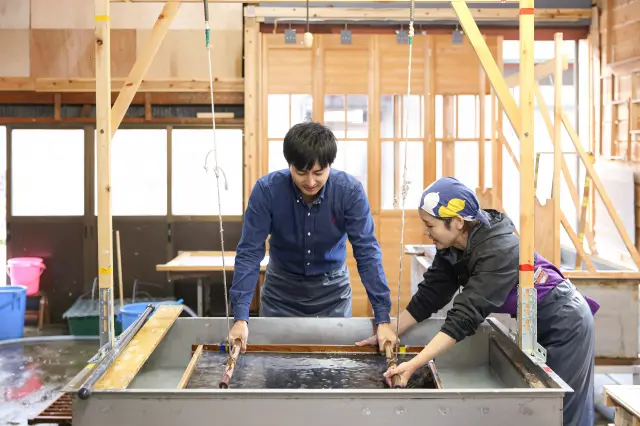
Fukui: A Journey to Experience Japan’s World-Class Craftsmanship
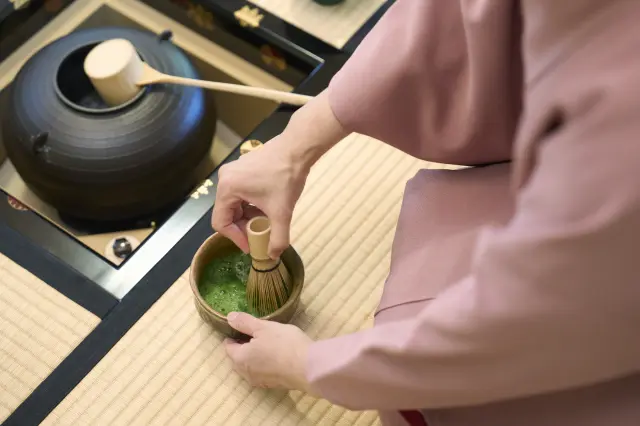
Osaka: A Journey Through Traditional Osaka
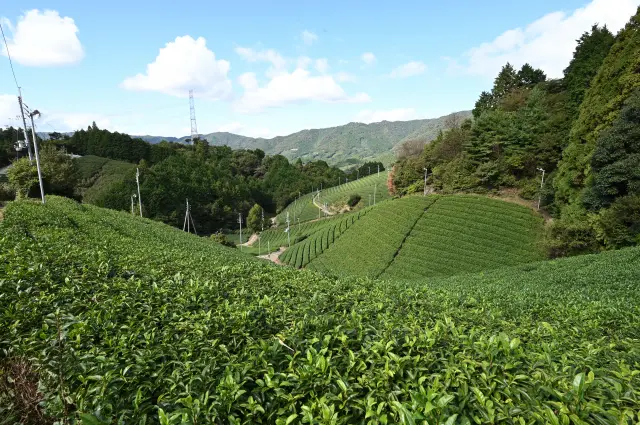
Kyoto: A Journey Through Japanese Gastronomy
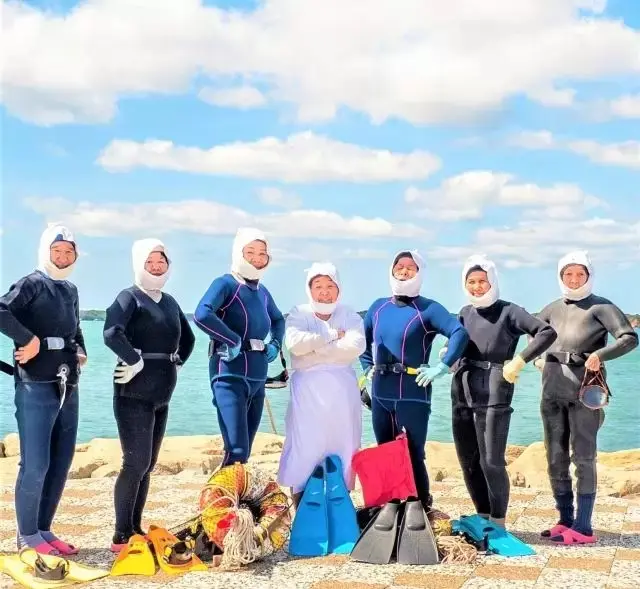
Mie: A Journey to Experience the "Ama Culture" Living Along the Beautiful Ise-Shima Sea
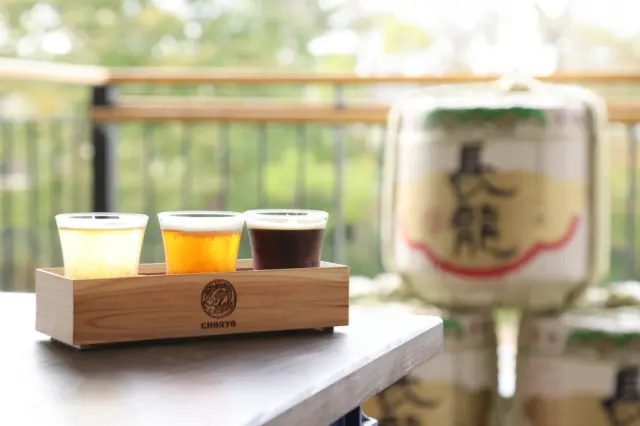
Nara: A Journey Through Its Ancient Fermentation Culture
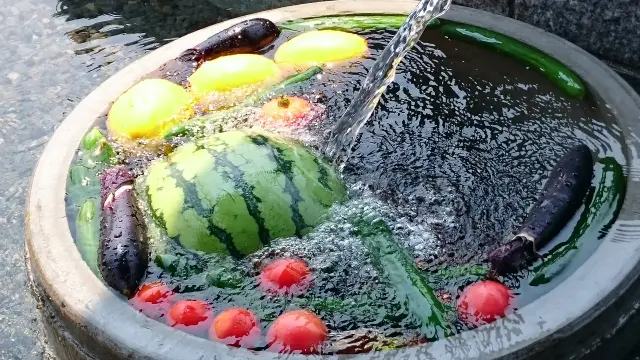
Shiga: Days Steeped in Nature and Blessed Waters Along Lake Biwa
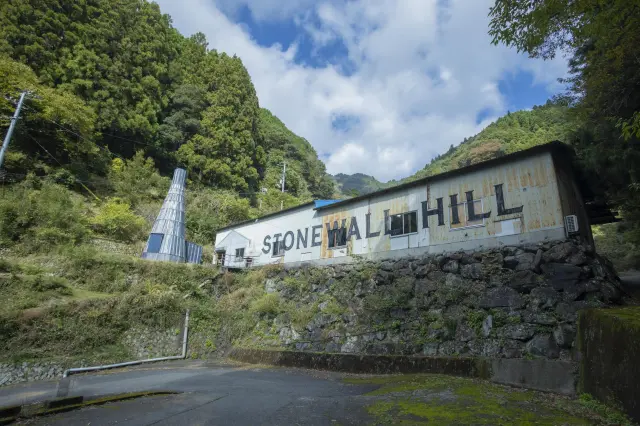
Tokushima: A Journey into Slow Living in the Mountains of Tokushima
